The Misinformation-Outrage Cycle
This is Part 3. It’s generally best to follow the advice given to Alice and the White Rabbit in Alice’s Adventures in Wonderland: “Begin at the beginning, go on to the end, and then stop.” But if you must read out of order, here are all the links:
- Part 1: There are no Yankees here.
- Part 2: Creating the Conditions for Mainstream Conspiracy Theories.
- Part 3: The Perils of Legal Punditry.
- Part 4: Social Media Makes it Worse
- Part 5: Get the Fighters Fighting and Keep Them Fighting
- Part 6: Invented Narratives and the Outrage Industry
- Part 7: The Outrage Machine Strikes Again: The 14th Amendment Section 3 Debacle
- Conclusion: What To Expect Going Forward
Part 3: The Perils of Legal Punditry
Before I explore some of the conspiracy theories that sprung up around Merrick Garland in 2021 and 2022, we need some basic facts about investigations. Yes, it’s complicated, which is why so many conspiracy theories sprang up.
(1) Evidence that is admissible in court takes time to assemble. This is because:
-
- Law enforcement can no longer beat confessions out of people. Witnesses can take the Fifth. Compelling testimony requires procedures.
- It is particularly difficult to get to the notes and phones of lawyers because special privileges apply. Many of those in Trump’s inner circle who assisted him were lawyers.
- It is also difficult to get to the notes and phones of members of Congress because special privileges apply.
- The Federal Rules of Evidence are complicated. If you don’t believe me, click here. There are no “I saw it on the Internet” or “We all know he is guilty” exceptions to the Federal Rules of Evidence.
- With complex cases involving lawbreaking that happened behind closed doors or (with only a few witnesses who don’t want to talk) assembling the necessary evidence often takes years.
(2) Investigations are bungled when investigators jump to conclusions about the evidence or fail to obtain all the evidence.
If you want to know why assembling the evidence against Trump in the January 6 case takes time, see this post. (If you have never read my story about drugs in the back of the truck please read it .)
(3) Prosecutors who lack intellectual humility are more likely to rush to trial, bungle the case, and end up with an acquittal or dismissal. (These same prosecutors, however, can often thrive as partisan pundits, where lack of intellectual humility is a virtue.)
Some facts about former prosecutors: Since 2016, people in what we might call the cable news / left-leaning social media echo chamber have been carrying on a love affair with former prosecutors. Anyone who can claim to be a former federal prosecutor is suddenly a national authority. The problem is that the category “former federal prosecutor” includes an entry-level job requiring a law degree and one year of legal work experience. At any given time, there are 5,000 AUSA (Assistant United States Attorneys or federal prosecutors) practicing. The turnover is high, which means tens of thousands of people out there can call themselves former federal prosecutors. When a person doesn’t move up the ladder, they frequently blame the people higher up the ladder for not recognizing their supreme talents. This is simple human nature. It is also easy to puff up resumes making a low-level position appear important because low-level people work on teams with more experienced lawyers.
(4) DOJ investigators conduct their investigations out of the public eye.
There are numerous reasons for this, including (1) prosecutors don’t want witnesses to know what they’ve gathered and (2) rules forbid federal prosecutors from talking about ongoing cases because this may violate the rights of witnesses and potential defendants.
From the DOJ guidelines: “DOJ generally will not confirm the existence of or otherwise comment about ongoing investigations.”
(5) Grand juries are assembled late in the process. This is from the DOJ website:
(In other words, a grand jury is not the starting point. It happens after the prosecutors gather as much evidence as they can.)
The DOJ is forbidden by law to talk about grand jury proceedings. Witnesses are asked not to talk, but they can. The witnesses who are cooperating and/or have no criminal liability generally do what the prosecutors ask them to do. Prosecutors will always begin with the witnesses who are willing to talk. It is, therefore, only when hostile and unwilling witnesses are called to the grand jury that leaks will happen, and this happens much later in the process.
(7) One of the bedrocks of democracy is prosecutorial independence.
In autocracies, the head of state decides who to prosecute. One of the most chilling moments for me during the Trump administration was when Trump tried to weaponize the DOJ and use it to go after his political enemies. As our rule of law system is designed, the president appoints an AG and lets the AG do his job independently.
Here is the problem: If an investigation is leakproof, and if it takes at least a year to reach the stage where prosecutors are interviewing people who are hostile and likely to leak, what will the producers of cable news shows do during all that time? How will they hold their audience? How will they provide entertainment?
Given the pattern Prof. Young described in her book, we can expect them to embrace a “conflict frame.” (p. 144) They will offer “emotionally evocative performances of partisan identity.” They will tie the topic to “broad themes in the culture war, and typically do so with an ‘in your face’ interpersonal conflict style that increases viewer engagement while increasing viewer’s hostility to the other side.” In doing so, they will “reinforce viewer’s partisan identities.” All of this provides “partisan operatives the opportunity to directly misinform audiences.” (pp. 144-145.)
Recall also that partisan pundits reflect back the fears and views of their viewers.
How I will proceed
I will intersperse what we knew was happening with what partisan pundits and influencers were saying. The juxtaposition will probably speak for itself, but I will break the timeline into approximately five-month increments and offer analysis.
I do not watch cable news. Assembling evidence to support my hypothesis by watching videos would have taken months. Many of these pundits are on social media with large followings. I grabbed examples from videos and posts from social media. Obviously, this is only a sampling.
Merrick Garland was sworn into office on March 11. Another six months would pass before a US Attorney in D.C. would be appointed.
On February 22, 2021, at Garland’s confirmation hearing, Sen. Sheldon Whitehouse, a Rhode Island Democrat, encouraged Garland to look “upstream” and “not rule out an investigation of funders, organizers, ringleaders, or aiders and abettors, who were not present in the Capitol on January 6.”
Garland responded by saying, “We begin with the people on the ground and we work our way up to those who were involved and further involved. We will pursue these leads wherever they take us.”
As of April, more than 400 people had been arrested for participating in the January 6 insurrection. They were ground level, which was where Garland said the investigation would begin.
On June 5, former prosecutor Richard Signorelli assured his Twitter audience of more than 100,000 followers that Matt Gaetz (a member of Congress), Giuliani (Trump’s personal lawyer), Trump, and others would be indicted and arrested within 3 months:

Notice that his Tweet has almost 10,000 “likes” and would have been seen by far more people.
Also on June 5, Pam Keith, a lawyer and former candidate for Democratic office (who then had a blue check) told her 100,000+ followers that the “Biden team” is woefully bad at protecting and enforcing rule of law, and that Biden needed to have a “tete-a-tete” with Garland.
On June 7, 2021, Sarah Kendzior, who often appears on TV and hosts a popular podcast and has almost 600,000 followers on Twitter told her audience this:
On June 9, 2021, Kendzior called Garland a “mafia state enabler” and accused him of keeping his eyes closed:
As of July 6, 2011: more than 535 defendants had been arrested and charged in connection with the January 6 investigation.
On July 11, 2021: in this video, MSNBC legal analyst Glenn Kirschner (who also has a popular YouTube channel and a large social media following) implored Merrick Garland to protect our families from Trump, who keeps “peddling the Big Lie.” (Note: Lying to the public is not a crime. We have a First Amendment. The government cannot prosecute a private citizen for lying to the public.)
In the video, Kirschner says (as if speaking directly to Merrick Garland), “As of yet, you have given us zero assurances that you are going after the one who gave the order . . instead, with each successive hate rally, you are letting Trump assemble a second batch or insurrectionists.”
Also in the video, Kirschner read from a Washington Post piece that described Merrick Garland as a weak man:
“Mr. Garland, slight, owlish, soft-spoken, and deliberative, has had to quickly learn that the scholarly approach that served him as a judge cannot on its own restore independence and credibility to an agency battered by Mr. Trump’s attempts to improperly wield its power. He has struggled to convey his message. . . “
Here is a sampling of how Kirchner’s viewers responded (highlighted for emphasis):
On July 19, 2021 TV Pundit and Legal Expert Elie Mystal similarly said: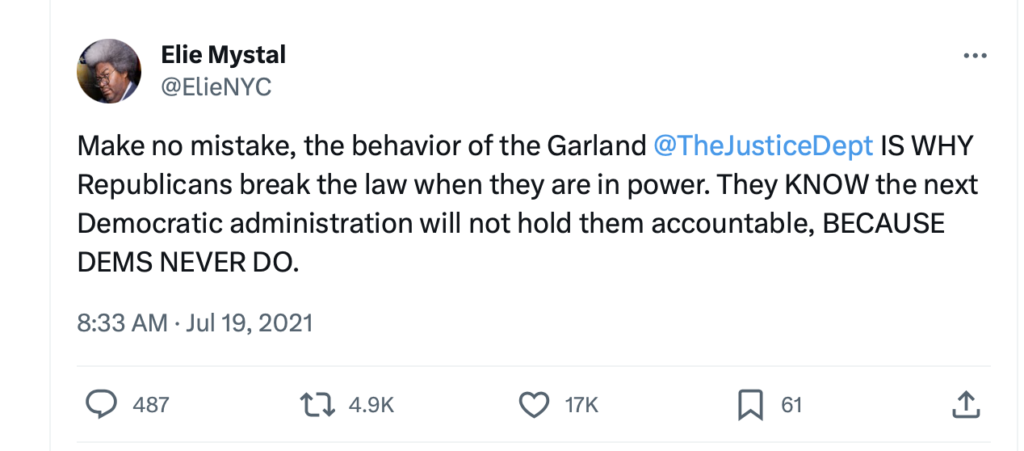
Pause here for a moment to consider what Mystal is doing. He is blaming Republican lawbreaking on the Democrats and the DOJ.
On July 27, 2021: the idea was picked up by Cheri Jacobus, who describes herself as a “political analyst”
(Again, lying, by itself, is not a crime. Because of the First Amendment, the government cannot stop a person from telling lies.)
Also on July 27, 2021: Don Winslow told his 900,000+ followers that Garland would likely never “go after Trump.” (Prosecutors don’t actually “go after” people. They follow the evidence of crimes.)
Analysis of April 2021 – July 2021
The developing conspiracy theory at this point is this: Nothing dramatic has happened in the investigation because Merrick Garland is either corrupt or weak and because Biden is refusing to do anything about the situation. As a result of Garland’s inaction, Trump keeps telling dangerous lies.
Remember that a conspiracy theory does not have to be unhinged or crazy. It needs to meet this definition (From Part II):
Conspiracy theories attempt to explain the ultimate causes of significant social and political events and circumstances with claims of secret plots by two or more powerful actors. They also assume that powerful people operating in the shadows are bad actors deliberately keeping the public in the dark.
(Yes, I know. the conspiracy theories prevalent on Fox and in right-wing media are more dangerous. Yes, the tendency to believe things that are not true is more prevalent among Fox viewers than MSNBC and CNN viewers. But believing things that are not true about important government processes is problematic wherever it happens.)
At this point, given that the investigation began four months earlier, the correct response of legal experts as of July, 2021: “We don’t know where this investigation will lead. We don’t know what evidence the prosecution will find. We don’t know what defenses people will put forward. We don’t know who we will be charged. All we can do is wait because the way our system works is that independent prosecutors make these decisions. Eventually, we will be able to evaluate whether Garland is doing what he said he would do and whether his methods were effective.”
The correct response would not be, “Don’t worry! Trust the DOJ! Garland will indict Trump and all of his pals!”
Let’s put what is happening so far on the process Prof. Young offered in her book Wrong: How Media, Politics, and Identity Drive Our Appetite for Misinformation:
- People face a situation that is confusing or seems incomprehensible. “It has been 4 months since Merrick Garland was appointed and nothing dramatic has happened. Trump is still a free man telling lies.”
- They look for a way to assign blame.
- They grasp onto an easy-to-understand theory that assigns blame. “It is the fault of Merrick Garland and the Democrats who are destroying rule of law.”
- The theory is being reinforced because people in their community who they identify with also hold the theory.
- Holding a conspiracy theory gives people a renewed sense of energy. Instead of feeling out of control, they have an explanation.
- Fueled by anger, they become defiant—but they have a direction. They feel they have agency. They can get behind a banner. They feel back in control
The examples I listed include “emotionally evocative performances of partisan identity,” and themes that tie the issue to larger questions of a cultural war. These examples also exhibit ‘in your face’ interpersonal conflict style that increases viewer engagement while increasing viewer’s hostility to the other side.” (In this case, the “other side” are Republicans, who, because of Garland’s inactivity, are growing more dangerous, and Garland himself, who is cast as an enemy of rule of law.) According to Young, these are characteristics of today’s partisan pundits.
In doing so, they will “reinforce viewer’s partisan identities.” All of this provides “partisan operatives the opportunity to directly misinform audiences.” (pp. 144-145.)
Notice also that 4 authoritarian tendencies have been activated:
- Glorifying strongmen and despising someone who appears weak and “owlish”
- Supporting authoritarian aggression “something must be done by any means necessary“
- Projectivity: We are at a “tipping point.” If someone doesn’t act quickly, all will be lost.
- All of this increases cynicism, which is another trait of authoritarianism.
(For more on the dangers of cynicism, see this post.)
Prof. Young tells us that “fear, threat, and uncertainty are associated with a higher likelihood of conspiratorial thinking.” (p. 48.) This the more frightened people became. the more likely they are to believe that nefarious forces are at work.
The real explanation, of course, is that at that point, we didn’t know anything because we were not supposed to know anything.
As you read the next section, notice how many legal pundits simply repeat what journalists not trained in the law said and recall this moment from Peter Arenella’s awakening that I wrote about in Part II:
August 2021 – January 2022
On August 9, 2021, CNN Legal Analyst Elie Honig said that there is “no sign” that Garland was conducting a meaningful investigation of the coup
One of Honig’s readers asked this:
Notice how the person takes the implication from Honig’s statement that “Garland is dragging his feet” (a statement not supported by any facts) and then understands that if Garland is refusing to act, there must be a reason–so he searches for a reason. Because we are in the realm of speculation seeking to assign blame for a bewildering occurrence, these are all conspiracy theories.
October 13, 2021: Notice that Tribe, a law professor, is responding to what Rob Reiner (an actor and film maker, who is not trained in the law), and how a reader responds:
As of November 6 more than 600 defendants had been arrested and charged with crimes in connection with the January 6 insurrection.
On November 6, the DOJ put out this statement:
On November 8, 2021 Constitutional law scholar Laurence Tribe said this in response to a substack piece written by a non-lawyer entitled “Where Oh Where is Merrick Garland”:
On Sept. 14, Elie Honig, a former prosecutor and CNN legal analyst, said this
As of October 15, the arrest count was growing, a Capitol Police officer had been charged in connection with the January 6 attack, and 100 Capitol rioters had pleaded guilty.
On November 23, Someone on MSNBC’s Nicole Wallace said “January 6th is almost a year ago . . . and not one person in power has been held accountable. . . “
In fact, it was 8 months since Merrick Garland was appointed. I won’t take apart the other absurdities.
People who watch Deadline White House tell me that Nicole Wallace pursued an aggressive “why isn’t Garland doing anything” line of questioning through this entire era.
Here is Tribe boosting the Nicole Wallace guest complaining that “nobody” had yet been held accountable and telling his readers to “Think about that.”
On December 6, 2021, Tribe, who is clearly becoming angry, said this:
On December 30, 2021: the US Attorney for DC said: “The investigation and prosecution of those responsible for the attack continue to move forward at an unprecedented speed and scale. The Department of Justice’s resolve to hold accountable those who committed crimes on Jan. 6, 2021, has not, and will not, wane.
January 5, 2002, in a speech Garland explained how the DOJ is conducting the investigation:
Analysis of July 2021 – January 2022
I thought Garland offered a clear explanation of what he was doing. I understood it was important for the DOJ to follow the usual procedures so that any indictments would have credibility with the public.
“Round up the usual suspects” and then look for the evidence is not the correct way to go about investigations. In fact, this is the very definition of political persecution.
Moreover, Garland was assuring the public that he intended to hold “all those criminally responsible accountable.”
Another thing to notice: There is silence from inside the DOJ. If Merrick Garland was not telling the truth, was deliberately “slow walking” the case, or had decided in advance not to prosecute Trump, someone inside the DOJ would know that. Therefore, we have two options:
- The upper echelons of the DOJ are complicit in Garland’s decision not to investigate Trump
- Garland was deliberately deceiving everyone: While they were all busy making hundreds of arrests and pursing leads, they believed the plan was to bring all people with criminal liability to justice, but at some point they’d be stunned to learn that Garland had a secret plan not to prosecute Trump.
We did learn later that people inside the DOJ disagreed with the method adopted by Garland. Instead, they wanted to start with the fake electors’ scheme. Here is what we learned later from the DOJ insiders who disagreed with Garland’s approach:
Before Garland was sworn in, Cooney put forward a plan: Go straight for the top with the fake elector scheme. But others didn’t like it. “All who assembled for the meeting were in agreement, with Axelrod making the final call: Cooney’s plan would not go forward.”
Garland and Monaco, after they were sworn in, agreed not to start with the fake elector scheme.
We never learn why they didn’t want to start with the fake elector scheme. (At least as early as May 25, 2022, the DOJ was looking into the fake elector plot.)
But we do find out that “some in the group” felt that “Seeking the communications of a high-profile Trump ally such as Stone could trigger a social media post from Trump decrying yet another FBI investigation as a witch hunt. And what if the probe turned up nothing?” (emphasis added)
(A public probe that turns out nothing causes the DOJ to lose credibility and casts doubts on any future indictment. Public confidence is paramount.)
I honestly (and naively) thought that Garland’s statement would tamp down at least some of the panic. I was wrong.
Also, because of the fractured media environment, people who believed that Garland was either incompetent or lying and, through deliberate action, was doing great damage to the country was a fraction of the population. People who didn’t hold this theory include:
- The insurrectionists being prosecuted
- Viewers of right wing media, including Trump and his inner circle: Their theory was that Garland was engaging in a politically motivated investigation
- People who spend, say, a half hour a day reading a newspaper or scrolling through Apple News and don’t think about politics the rest of the time and don’t follow the play-by-play
- People who tune out between national elections because the anger and rage gets exhausting
- People who are entirely disengaged
Personal story: A few weeks ago I was talking to a 27-year-old. She is a dedicated Democrat, a reliable voter, and is passionate about environmental issues. I asked her if she was following any of the drama about the Trump criminal matters. She said, “Wasn’t he charged with something?” She had no idea all of these theories were brewing.
January 2022 – June 2022
On January 5, 2022, Sarah Kendzior responded to Garland’s speech by calling it a “word salad” and an “empty PR gesture” made while “time was running out.”
On January 7, 2022, Tribe (a law professor) is quoting something a Politico reporter said to an MSNBC host:
On January 8, 2022, TV Pundit and legal expert Daniel Goldman speculated that if Garland actually was investigating Trump and his associates, we would know because there would be leaks from Trump world:
One week after Goldman made this pronouncement, there was a leak from Trump World that the DOJ was investigating Trump’s close associates:
On January 15, 2022, we learned from a defense lawyer representing insurrectionists (Rob Jenkins) that the DOJ had been “pretty aggressive” in “seeking out information . . . that points to others’ involvement and culpability” in planning the events of January 6, including Rudy Giuliani and Roger Stone.
This was actually the first leak. No surprise, it came from one of the defense lawyers. This leak, however, had no effect on the narrative that nothing was happening.
On January 19, 2022, Sarah Kendzior told her audience that Trump could be “put away” based on the Muller Report, and that Garland was “running out the clock” in a “dangerous dereliction of duty”:
(In fact, the evidence in the Mueller Report was likely not enough evidence to secure a conviction for obstruction (see this explanation, #6 ) and even if there was enough evidence for a conviction for obstruction, the crime would most likely be a misdemeanor. The first offense of a misdemeanor will not “put someone away.”)
January 29, 2922: Cheri Jacobus, a political podcaster with more than 200K followers on Twitter, told her audiences that Trump acts as if he knows he is safe from indictment:
On March 2, 2022, the DOJ secured its first conviction for seditious conspiracy for Joshua James, the leader of the Alabama Chapter of Oath Keepers. (Seditious conspiracy means conspiring to overthrow or oppose the authority of the government by force. This was the most serious charge thus far.) James was not at the Capitol during the riot. His plea deal required him to cooperate with prosecutors, including testifying to a grand jury. Also note: Joshua James was in Roger Stone’s hotel room the morning of the insurrection.
March 3: the fury and rage on Twitter in what might be called the MSNBC / CNN information community over the “fact” that Merrick Garland was “refusing” to investigate Trump had reached such a pitch that I wrote an FAQ page addressing the enraged questions I was getting. You can see the March 3 version of my FAQ page here.
March 10, 2022, CNN legal expert Elie Honig explained why (in his opinion) Garland was doing it wrong (even though he had no actual information beyond Garland’s statement):
On March 30, 2022, we learned that “in the past two months, a federal grand jury in Washington has issued subpoena requests to some officials in former president Donald Trump’s orbit who assisted in planning, funding and executing the Jan. 6 rally.“
Also on March 30, 2022 former prosecutor Alan Lieberman said this:
On April 6, 2022, An interviewer asked Elie Mystal, “What’s your sense of why Garland is taking his sweet time on this?“
Elie Mystal said: Because he was the wrong guy for the job . . . You see what Biden was going for? Right? You see the idea that what you wanted was an institutionalist who restore faith and the apolitical nature of the justice? Yeah, I get that we needed a Janet Reno. We needed a person who was going to go in there and flip some tables on these people, right, because that’s what Barr did. That’s what Sessions did. That’s what John Ashcroft would have done. That’s what Republicans do when they have that office.
Notice the phrase: “Flip a few tables” and the desire for Merrick Garland to emulate people like Jeff Session and William Barr, who went along with Trump’s efforts to politicize the DOJ.
On April 1, 2021, in response to a question about “all the Democrats pressuring Garland to bring charges,” Merrick Garland said “The only pressure I feel, and the only pressure that our line prosecutors feel, is to do the right thing, That means we follow the facts and the law, wherever they may lead.”
On April 8, 2022, former prosecutor Glenn Kirchiner garnered 16K likes when he asked “How long do we have to endure this open, treasonous criminality by Trump and company before someone gets indicted?” (this kind of thing, incidentally, led nonlawyers to believe that an indictment is something other than a formal accusation followed by a long, tedious process with unpredictable results):
Sometime in April of 2022 the DOJ investigators received the phone records of key officials and aides in the Trump Administration, including Trump’s former chief of staff, Mark Meadows. (We didn’t learn about this until July.)
On April 22, 2022: Elie Mystal said: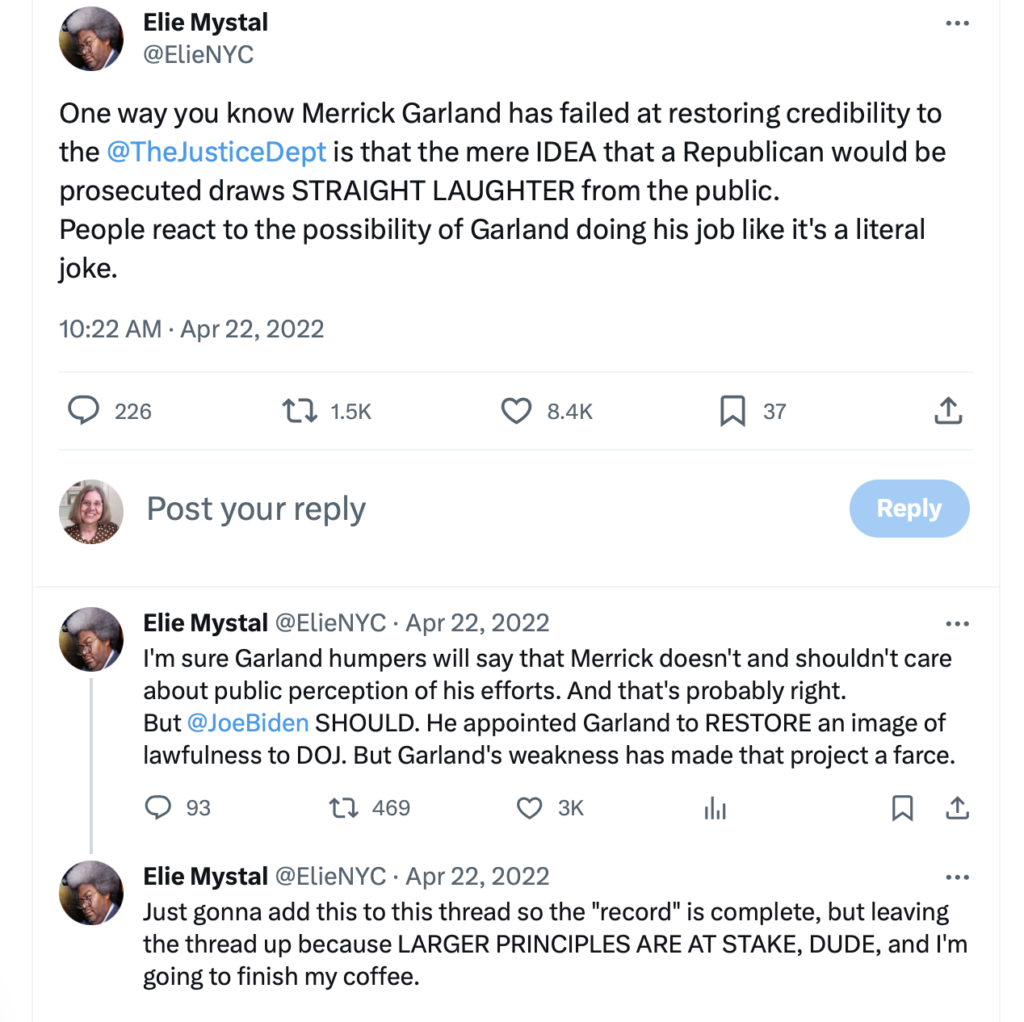
Notice that the phrase “Garland humper.”
On May 26, 2022 we learned that the DOJ subpoenaed information about some of former President Donald Trump’s lawyers and closest advisers as part of their criminal investigation into efforts to put forward fake slates of electors in the 2020 election. Among those asked about were Rudy Giuliani, adviser Boris Epshteyn and campaign lawyer Justin Clark.
On June 7, 2022, an MSNBC legal commentator said referred to the DOJ investigators as “crocheting”:
Notice that what we might call strongman worship is taking the form of feminizing Garland.
June 22, 2022, we learned that FBI agents searched the home of Jeffrey Clark, a former Justice Department official, who tried to help Trump overthrow DOJ leadership and overturn the election.
On July 11, 2022, former prosecutor Andrew Weissman (who now makes frequent appearances on Cable News) made a splash with a NY Times Opinion Piece slamming Merrick Garland, generating headlines like this one:
Notice “or lack thereof” immediately after reporting that the DOJ seized the phones of lawyers in Trump’s inner circle. Weissman’s argument, like Honig’s, was that Garland was doing it all wrong.
Politico characterized Weissman’s New York Times piece as “capturing the frustrations of some legal observers and former Justice Department prosecutors.”
On July 24, 2022, Glenn Kirschner said:
It seems to me that seizing the phones of one of Trump’s lawyers and a top DOJ lawyer was an “overt” action.
Then, on July 26, The Washington Post reported that new evidence had emerged that the DOJ was investigating Trump himself:
Justice Dept. investigating Trump’s actions in Jan. 6 criminal probe: People familiar with the probe said investigators are examining the former president’s conversations and have seized phone records of top aides
- In August, the DOJ shocked the nation by searching Mar-a-Lago pursuant to a warrant.
- The DOJ did, in fact, indict Trump in DC for the January 6 attack and in Florida for taking top-secret documents with him
At this point, the narrative changed from “Garland isn’t doing anything” to “Garland did it all wrong and that’s why it took so long.” The Garland haters became even more hateful.
Remember the first legal expert / former prosecutor I mentioned? The one who, in June of 2021, predicted that Trump, Giuliani, and Gaetz would be indicted within three months? With the year, he became one of the more vocal Garland haters on Twitter. Here is an example:
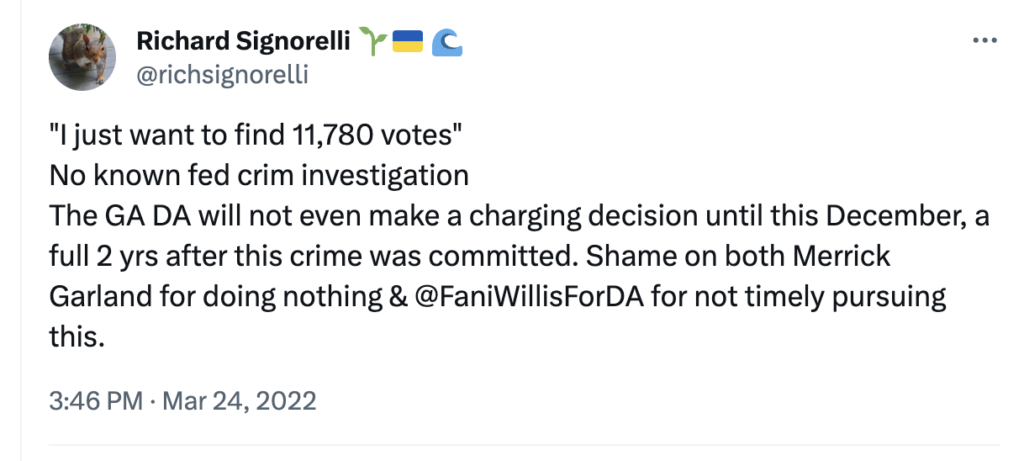
When his prediction turned out to be inaccurate, he never questioned whether perhaps he overestimated how quickly a case like this could move. Instead, he dug in and insisted he was right all along. Charges could have been brought within 3 months. The problem was that Garland did nothing.
The others similarly came up with theories for why they were right all along.
Theory #1:” I was right all along. The DOJ unnecessarily delayed the investigation for a full year. “ (This is proven wrong by the timeline. See also this post.)
Theory #2: “I was right all along. The DOJ did nothing until the J6 Congressional hearings began in the summer of 2022, and then they began investigating because they were pressured into it by the Congressional committee.” (This one is also easily debunked by the timeline. Everything I listed thus far happened before the first January 6 Congressional hearing.
Theory #3: “I was right all along about Merrick Garland. Nothing happened until Jack Smith was appointed.
Smith was appointed in November of 2022, three days after Trump announced his candidacy for president. Theory #3 is debunked by the fact that all of these things happened before Smith was appointed:
July 28, 2022: We learned that Former DOJ staffer Ken Klukowski, who worked with Jeffrey Clark, was cooperating in the DOJ Jan 6 investigation, including allowing a search of his electronic records.
August 3, 2022: Former Trump White House counsel Pat Cipollone and Patrick Philbin, who worked in the White House under Cipollone, were also subpoenaed by a grand jury for testimony and documents about the efforts to overturn the election. They are expected to appear before a federal grand jury on September 2.
August 9, 2022: FBI agents seized Rep. Scott Perry’s phone.
August 10, 2022: The FBI delivered subpoenas to Pennsylvania lawmakers.
August 15, 2022: We learn that a federal grand jury investigating the Jan. 6 attack subpoenaed Trump White House lawyer Eric Herschmann for documents and testimony.
September 6, 2022: A federal grand jury sent subpoenas on Wednesday to a wide range of former campaign and White House staffers asking for information about the Save America PAC. At least one of the subpoenas also demanded information about the plan to submit slates of phony electors claiming Trump won pivotal states, including all communications with several key lawyers and advisers involved in the effort, including Rudy Giuliani, Boris Epshteyn, Bruce Marks, Victoria Toensing and Joseph DiGenova. Among those subpoenaed was William Russell, who served as a special assistant to the former president and went to his home in Florida. Steve Miller was among those subpoenaed. Rumors on Fox were that some had also received search warrants (presumably for documents.)
Between September and December 2022, the DOJ had to jump through legal hoops to secure the testimony of three of Trump’s lawyers, M. Evan Corcoran, John P. Rowley III, and Timothy C. Parlatore, Pat Cipilonne, Rudy Giuliani, Pat Philbin, Marc Short, and Greg Jacob.
Then, on June 23, 2023, The Washington Post published a “bombshell” that some insiders didn’t like Garland’s approach and wanted him to start with the fake elector plot. The insiders then accused Garland of not getting to the electors for a year when he could have gotten to them sooner. (None of this was a bombshell.)
But what happened? Big-name legal commentators waved around The Washington Post piece saying, “See! Look! I was right all along! Garland was doing it wrong!”
It was embarrassing and unworthy of intelligent lawyers.
Then things got worse. Because the legal commentators who had been slamming Garland for a year claimed to have “evidence” that they were right, the article went viral. People read the misleading headline and came to a different conclusion: “See! We were right all along! Garland did nothing for a year!” (For my breakdown of that Washington Post piece and how the reporting was twisted and misunderstood see this post.)
Teri? What are these pundits are saying now that DOJ court filings indicate that the investigation began immediately?
To begin with, they don’t read the court filings. Moreover, confirmation bias is a powerful thing. Once people hold an incorrect idea, they will interpret all new information as confirming their existing ideas. For example:
To begin with, Kendzior is citing a poll about Republican voters and using the results of the poll to make a statement about “all Americans.” The most charitable thing to say is that this was sloppy. Notice almost 1,000 “likes,” meaning that at least 1,000 people failed to see the error.
I surmise that the carelessness happened because she is looking at everything through a slant of “see I was right,’ which is what confirmation bias is all about.
In fact, any way you look at the polling, Trump’s polling numbers among Republicans improved when he was finally indicted.
People without intellectual humility rarely admit they were wrong. Moreover, the same pundits who spent 18 months misleading the public about Merrick Garland and the DOJ investigation are back on TV offering new opinions that many viewers will accept as facts. They lost no credibility.
The people who demanded accountability faced none for misleading the public.
The show must go on.
* * *
What they are doing is leveraging your very real (and legitimate) fears about democracy to keep you glued to the screen. My message to anyone listening: Get out of that rage-feeding echo chamber. It isn’t productive or healthy.
Click here for Part 4: Social Media Makes it Worse
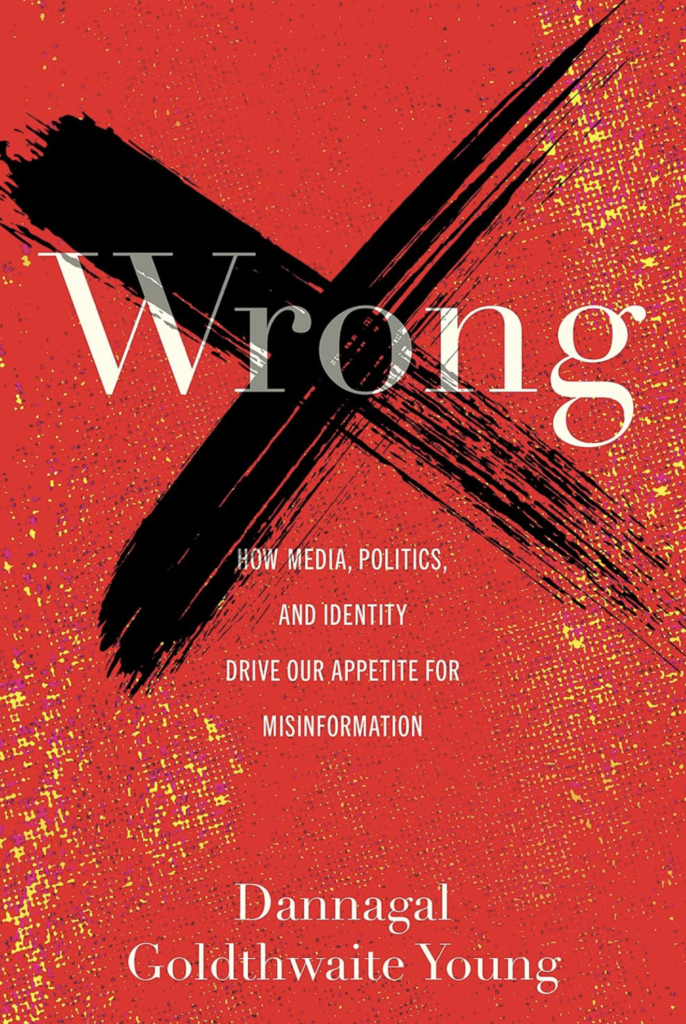
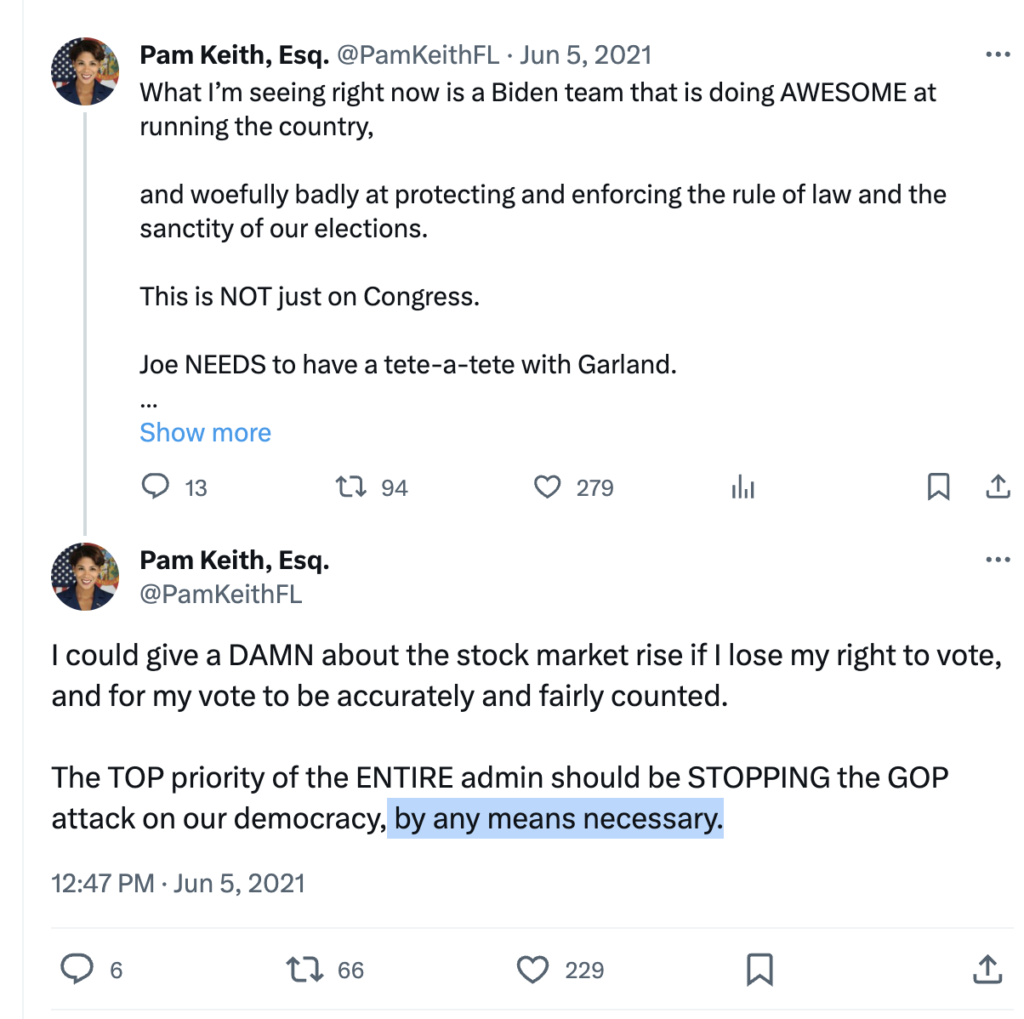

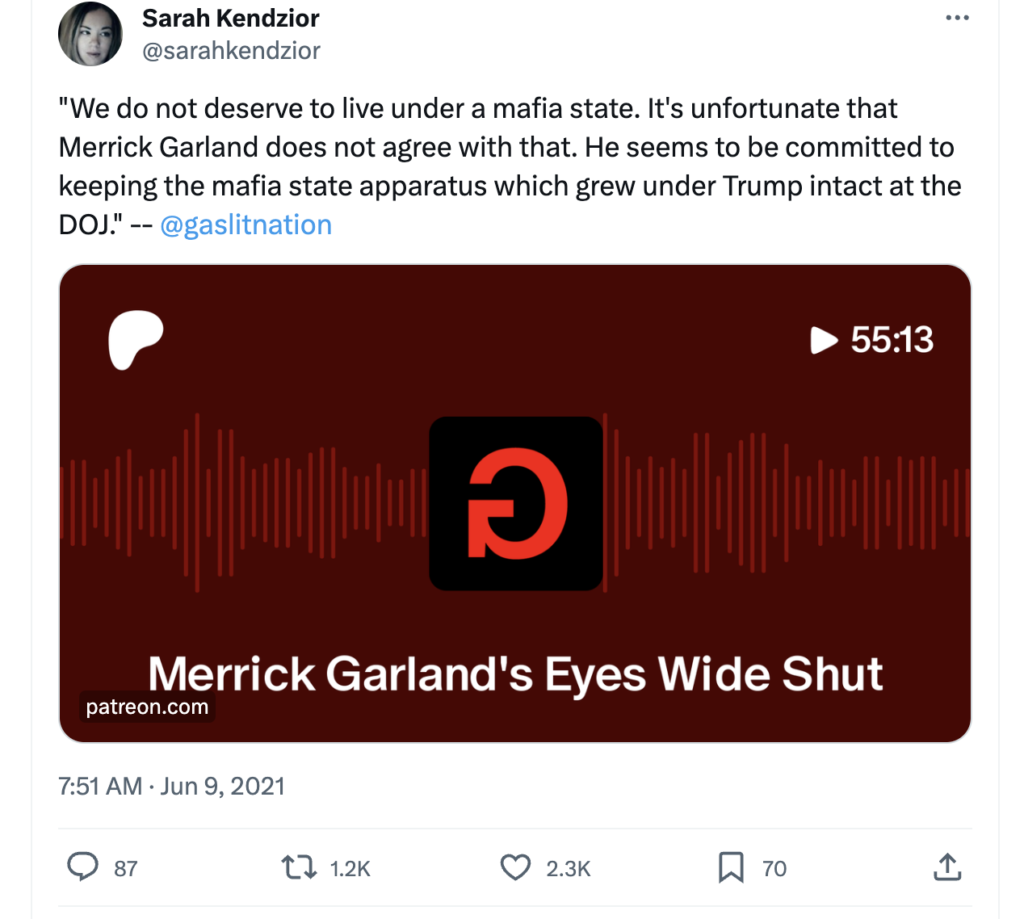
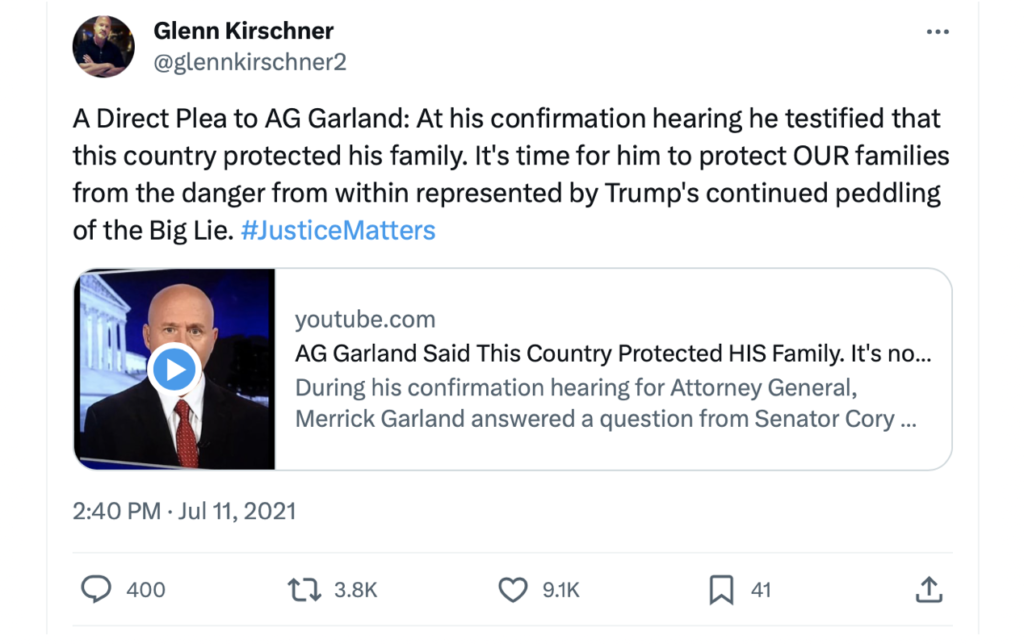
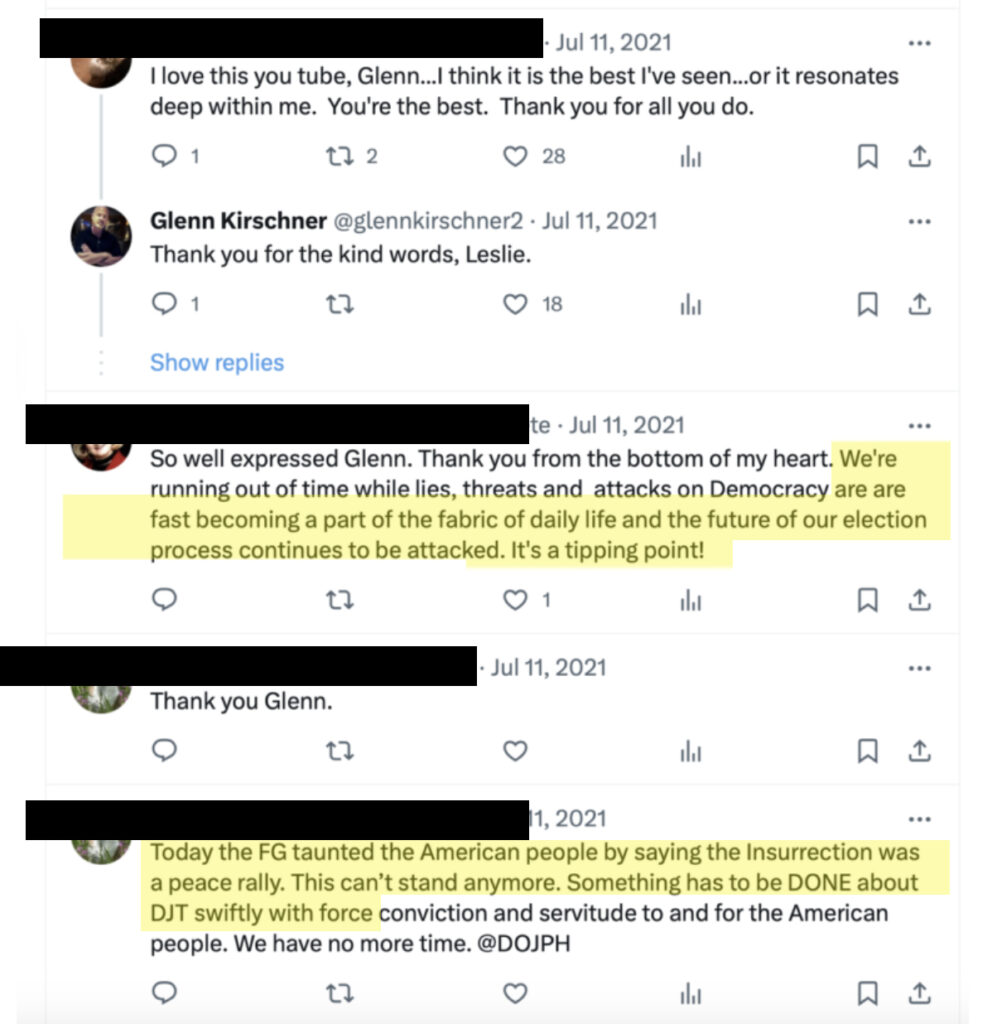
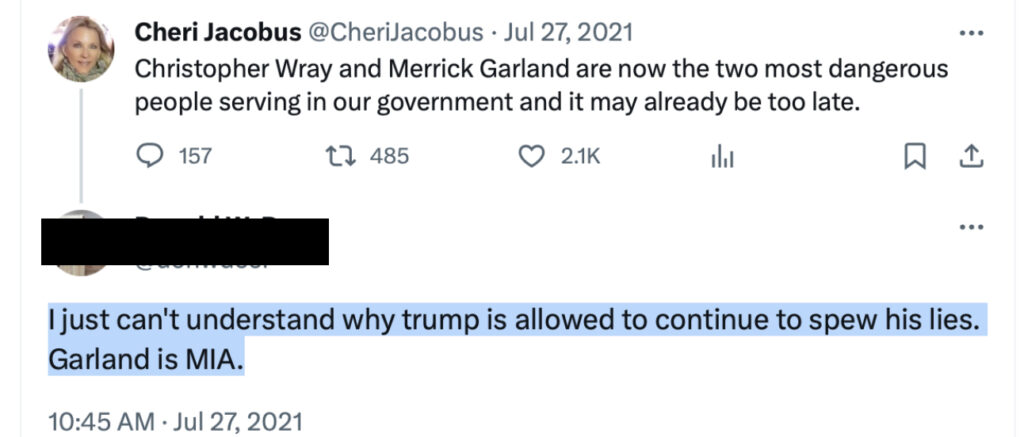
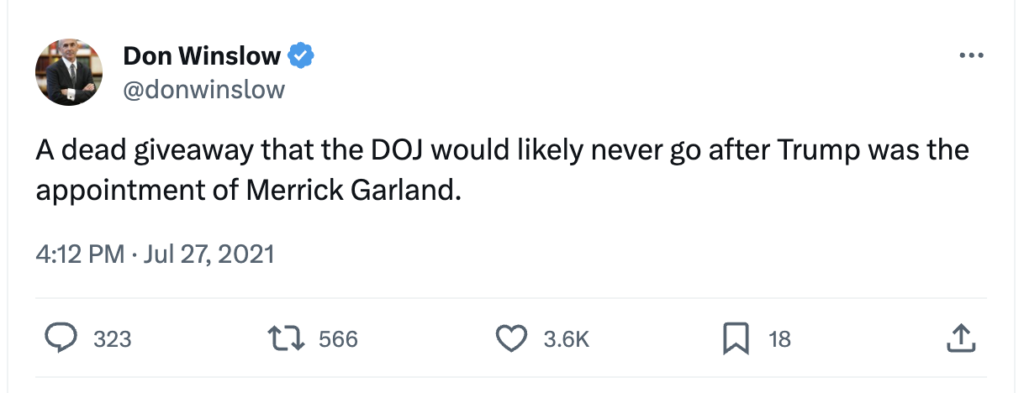
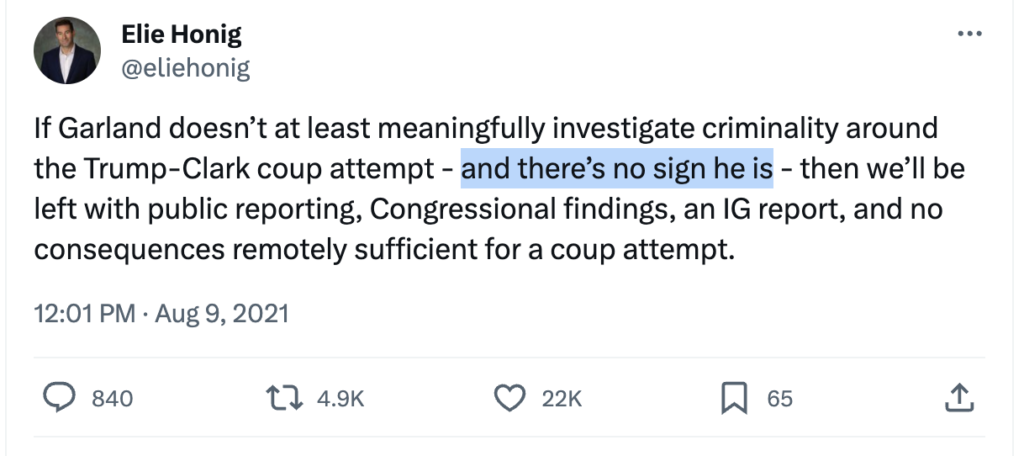

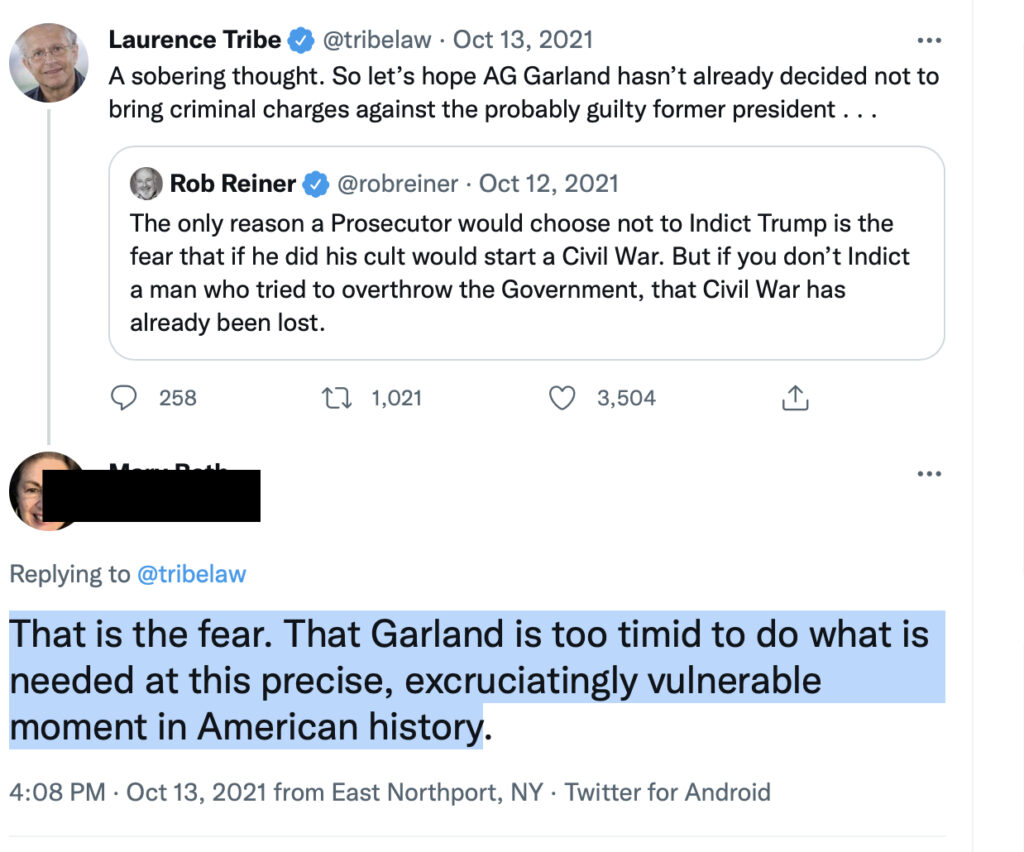
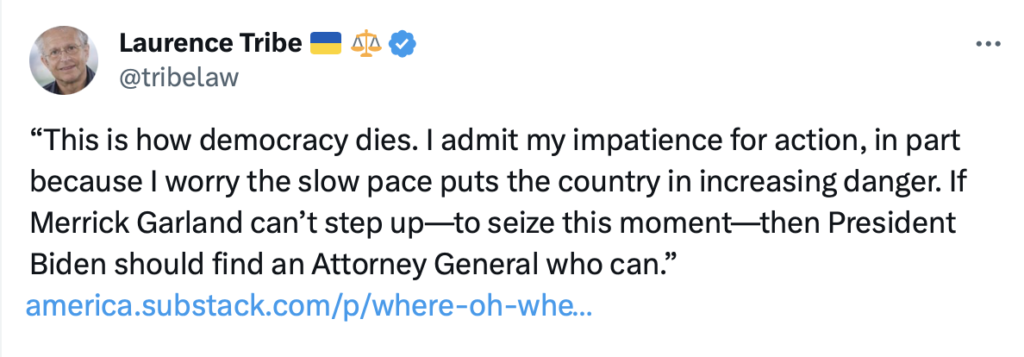
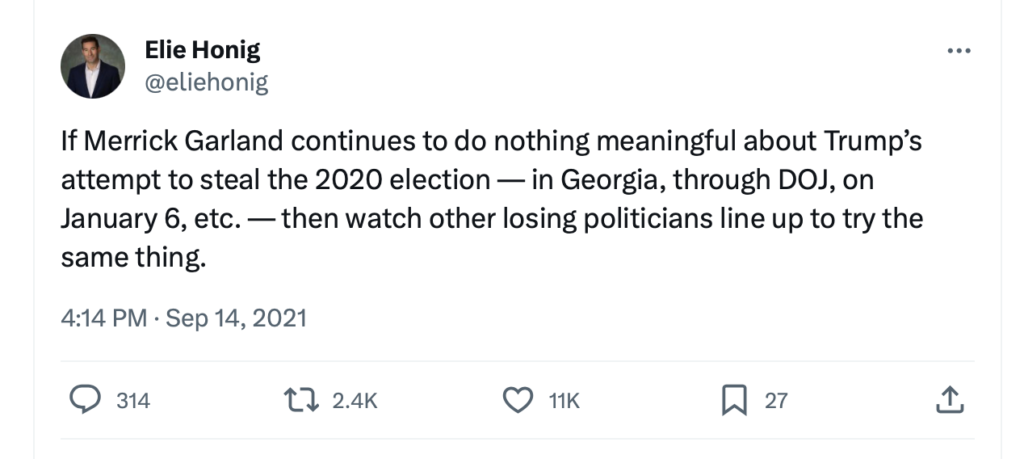
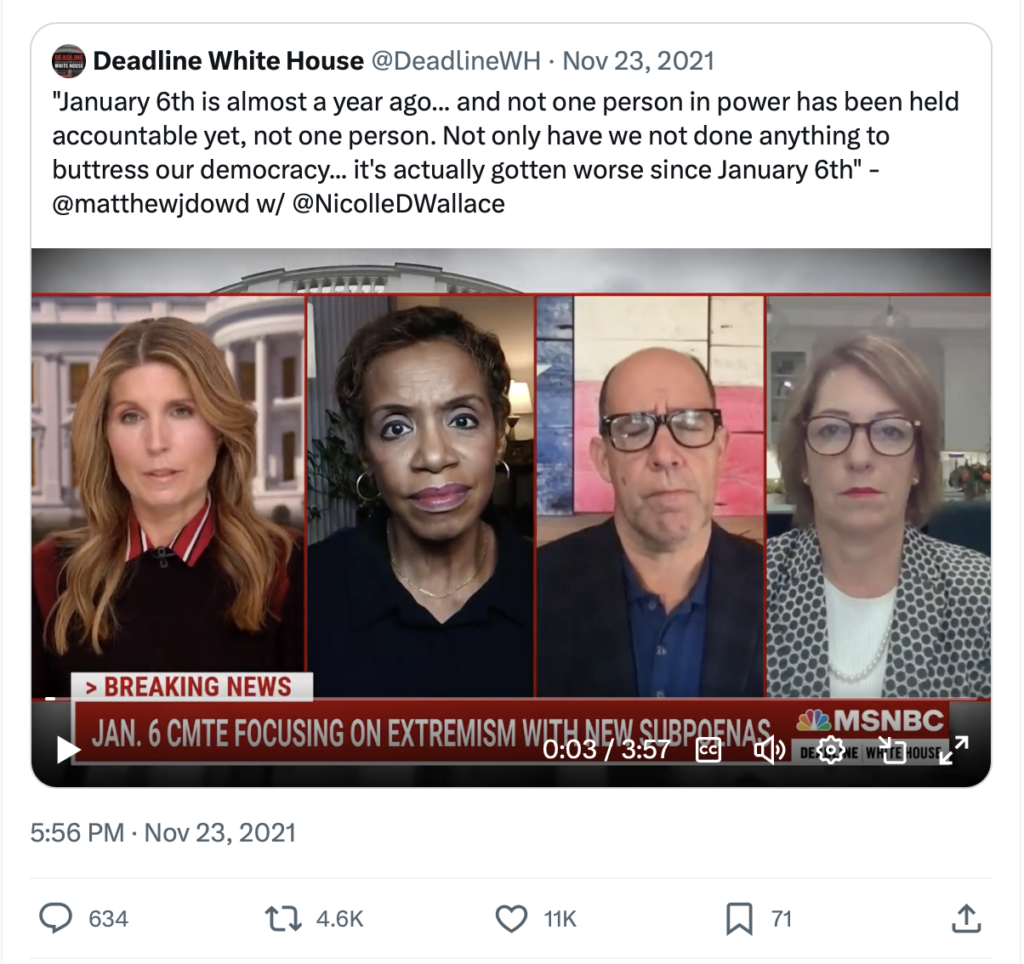
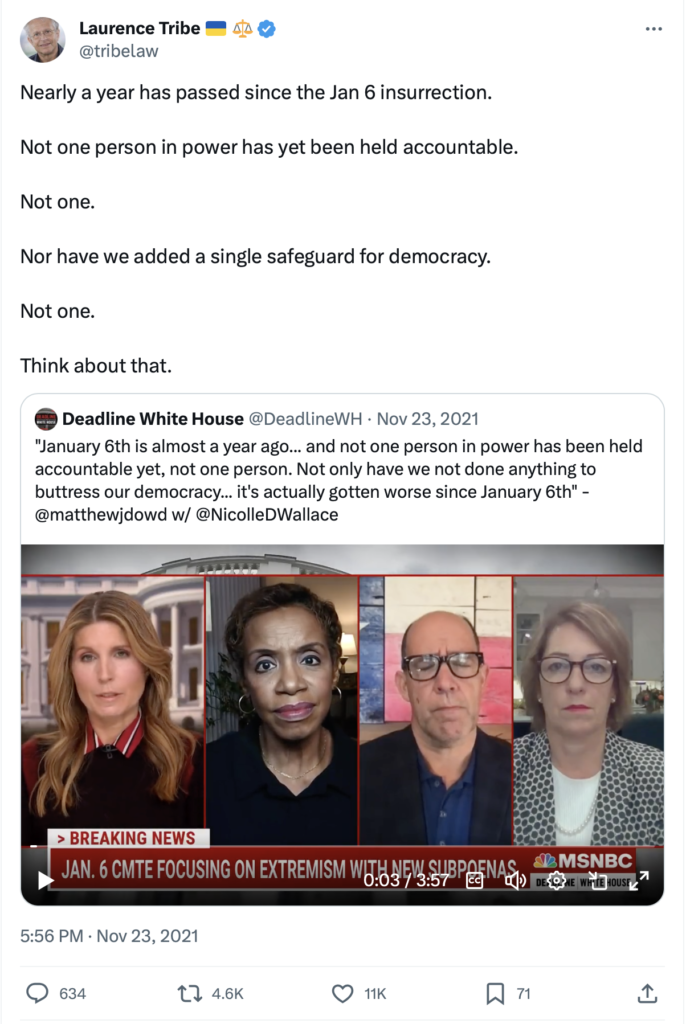


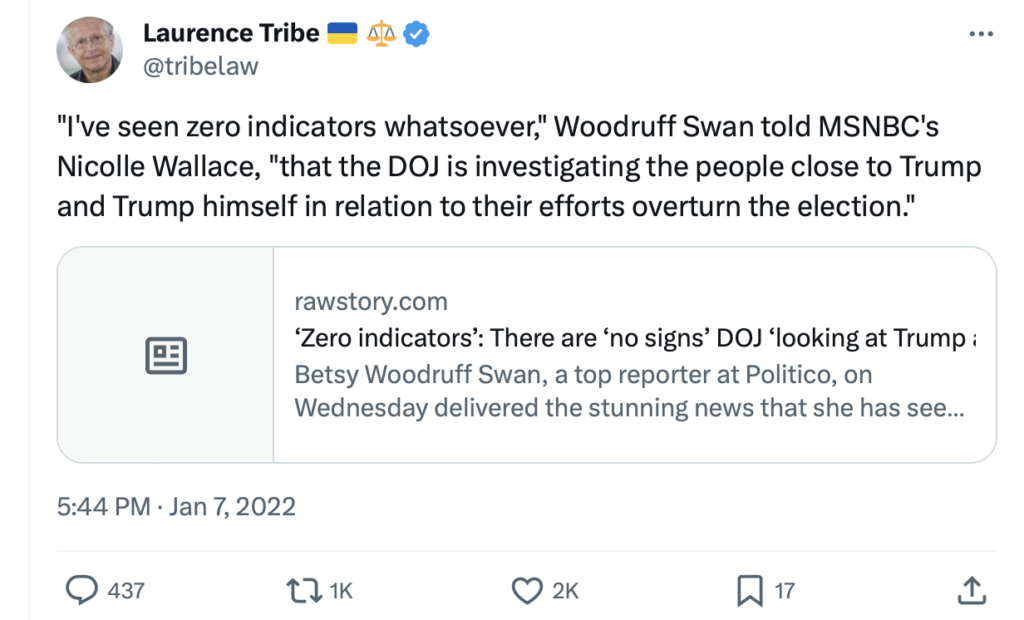

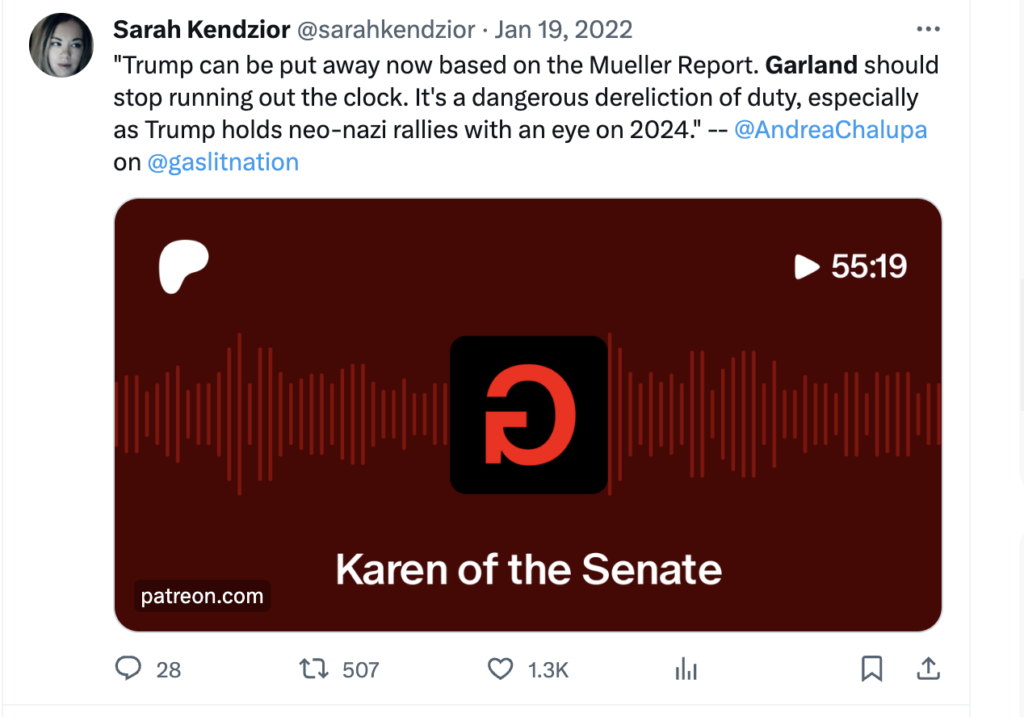
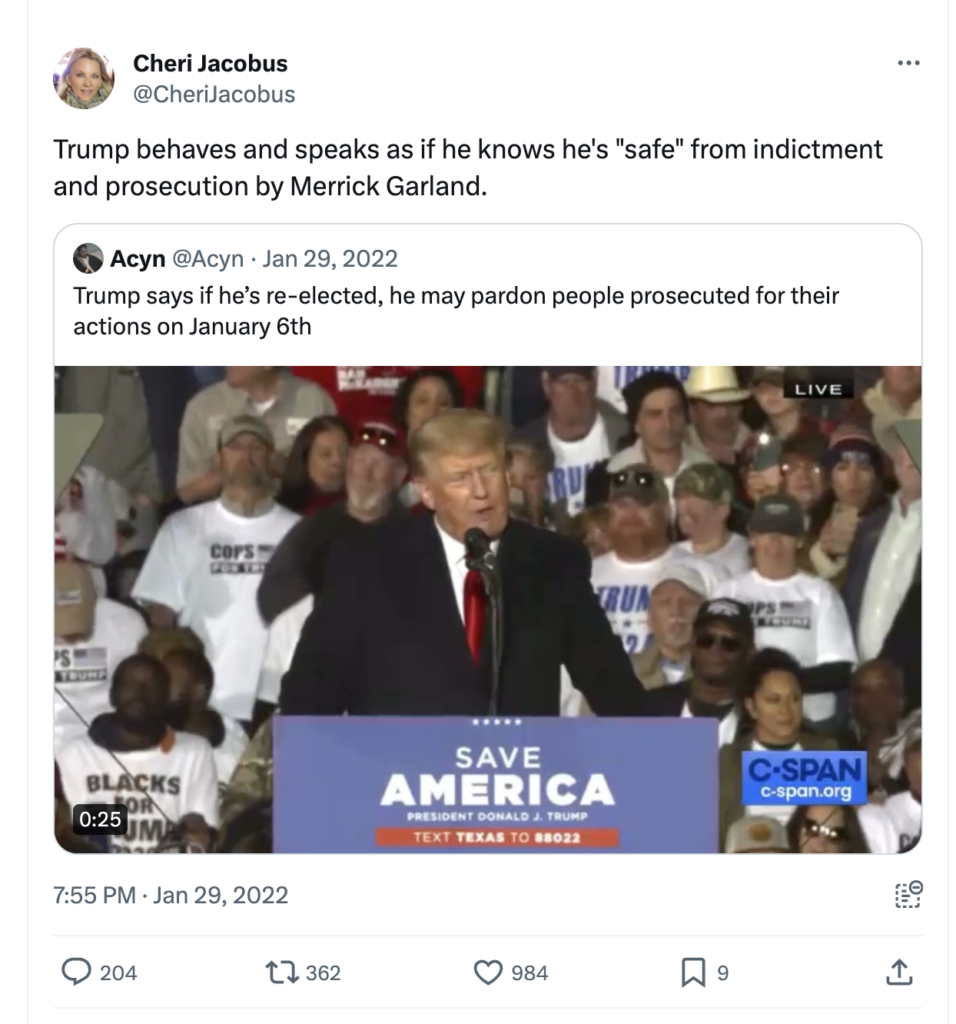

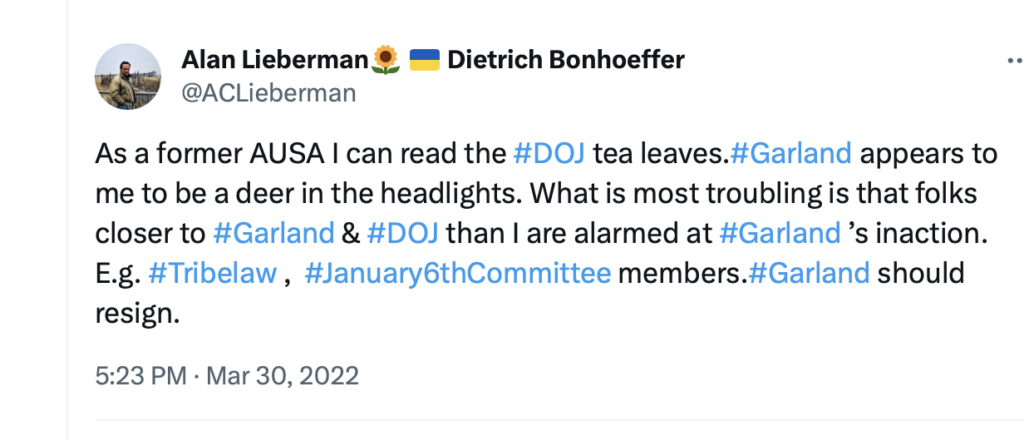
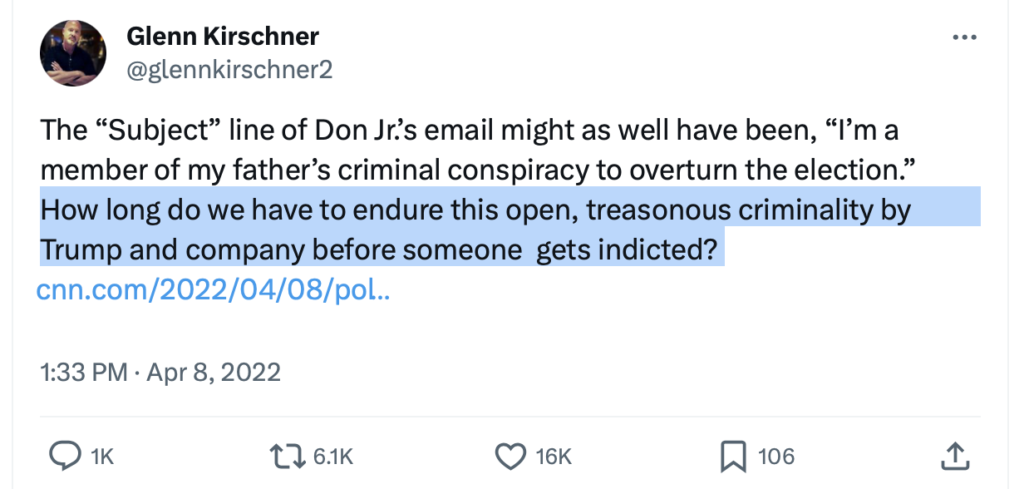
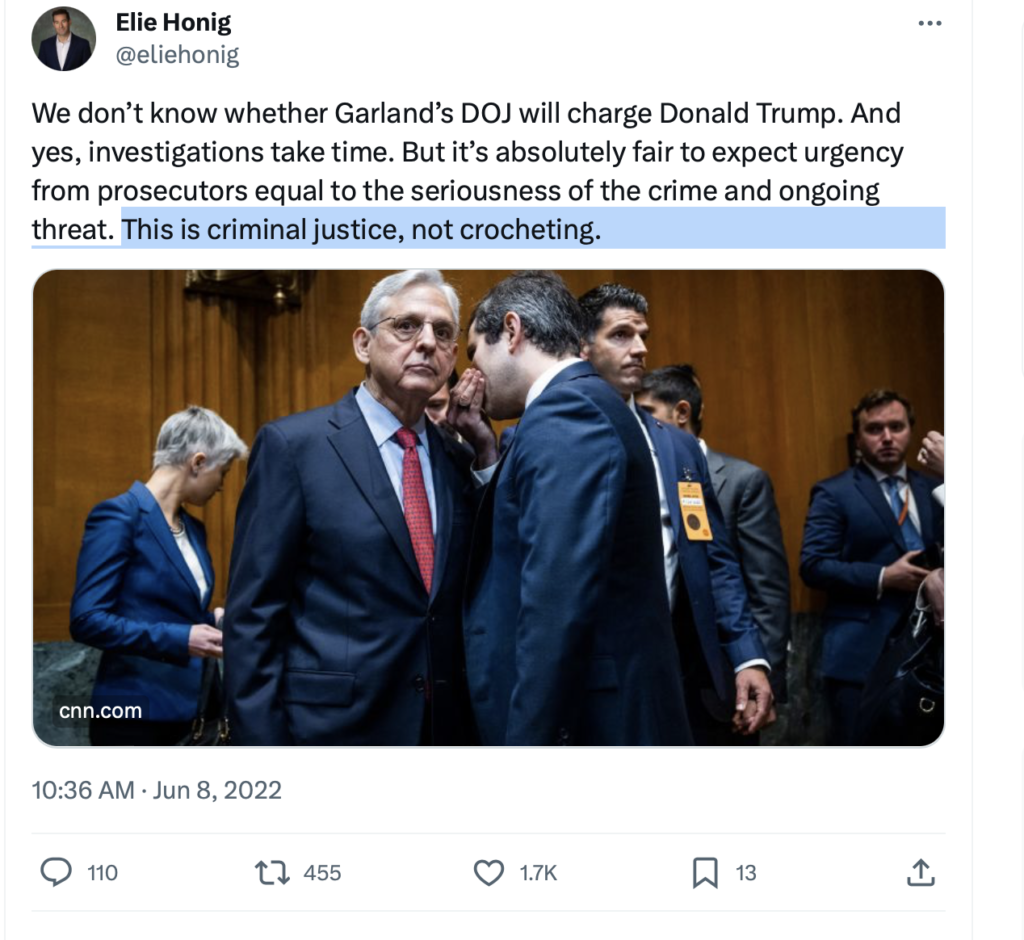
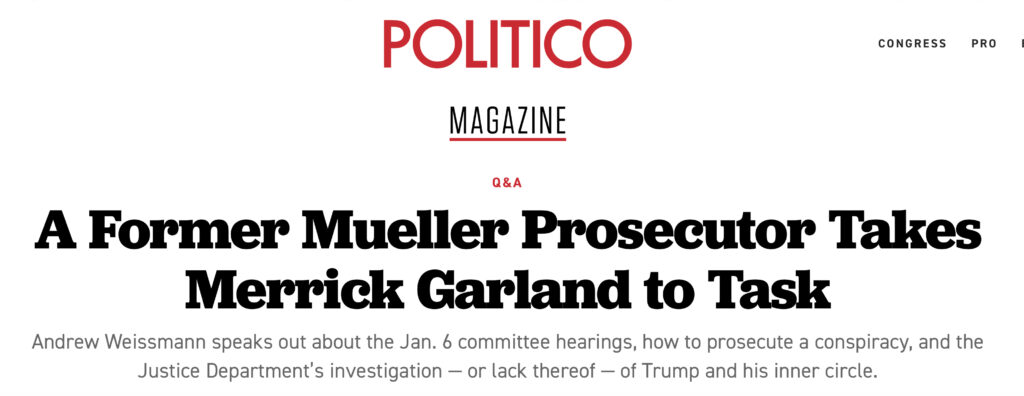
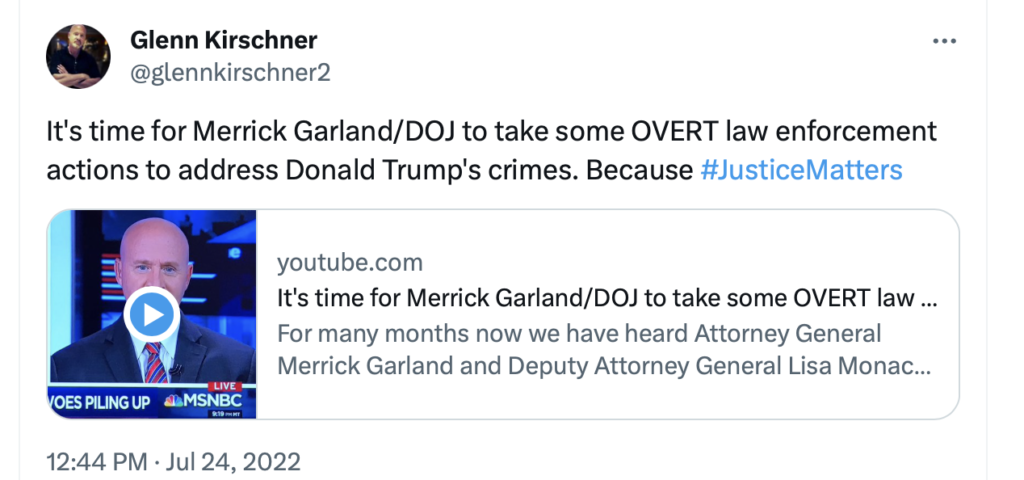
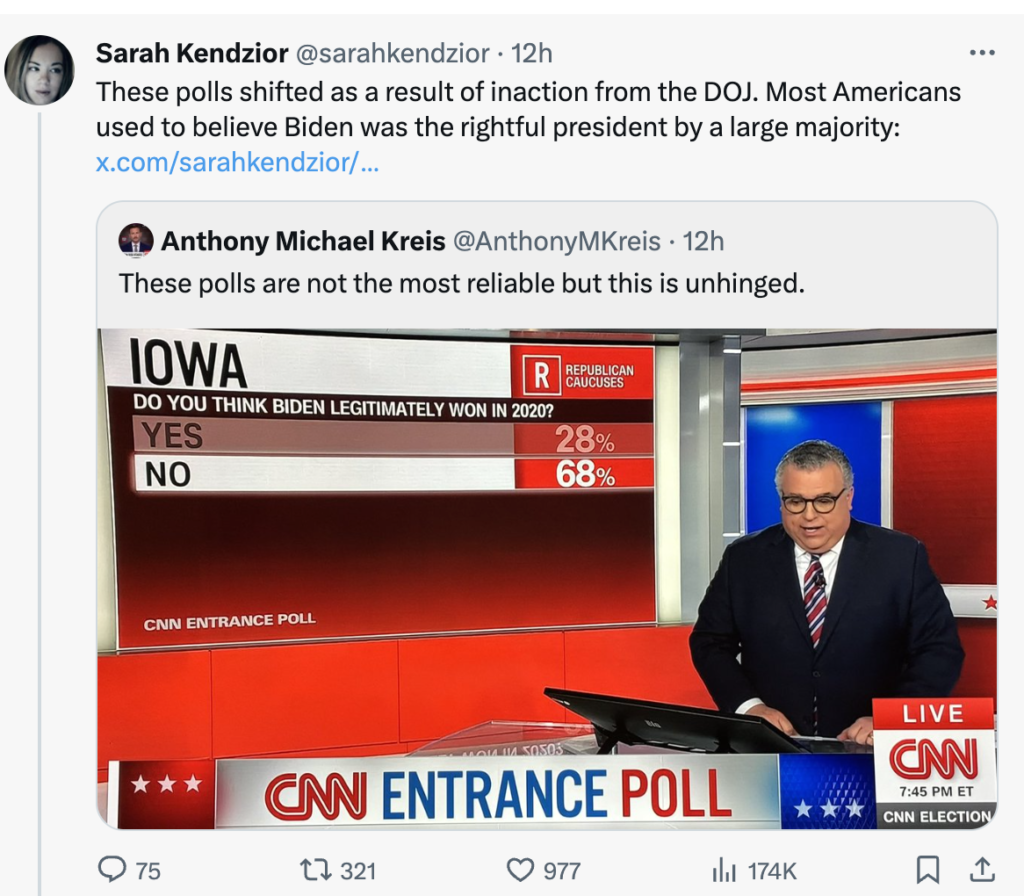
Yes, indeedy: lots of hyperbole. In the 2021 time frame, I was looking for some action on the campaign finance issues, since 2016 + 5 –> 2021. I suppose there could be sealed indictments, but I do not think so. Was tRUmp given a bye? Were they predecessor acts to a longer running conspiracy? Inquiring minds want to know (or, at least, given a hint).
Thank you.
Teri,
Very thorough, thoughtful and logical. Since you are not emotional, rash and judgmental, you probably are not who MSNBC wants as a legal expert “pundit”. Keep up the great work.
Yes please!!
Thank you, Terry, for your meticulous documentation and analysis. I have a different take on why we see and hear what we do on cable, whether it’s on “the left” or “the right” but it’s not appropriate for this discussion right now.
I refuse to watch any cable/broadcast “news” or “talk shows” for the reasons cited by Professor Young and you. While the level of inflammatory and disingenuous “debate” which entails obfuscation, distortion or lies is not “illegal”, or “immoral”, I think it’s irresponsible and unethical at any time, but particularly now, when we are constantly fighting to maintain that last blue line between democracy and fascism. The last thing we need are pundits gleefully undermining the rule of law to advance their careers or agendas.
Dear Teri,
I think your judgement of cable news veracity fails to acknowledge at least one important dimension of the difference between Fox and MSNBC, which is the presenters’ attitudes (and intentions) with respect to cultural (and legal) norms. There may indeed be factual errors and exaggerations in both camps, and we can deplore any deviation from strict factual reporting, but not all lies, mischaracterizations, and conspiracy theories are equal. In addition, as important as facts are in the news, we have to acknowledge another service, perhaps even more impactful than information, that news performs, which is affirmation and guidance for how to respond emotionally to complex information.
We’ve all heard the news axiom, if it bleeds it leads. Beyond our fascination with blood and violence, beyond the numbers of dead and wounded and the circumstances, our news reporters also model and perform the emotional tone appropriate to the news. The socially appropriate response to blood and violence and human suffering is a somber respectful reticent tone. The reason blood leads the news is not only because it grabs our attention but also because there’s no complication in performing the emotional part. When we watch the news, we aren’t just getting information about tragedies and the rest, we are also experiencing confirmation about how we should feel about it.
The reason I watch MSNBC is not entirely for the facts, and maybe only secondarily important is the information they provide, though it is important to me that they care about presenting factual information. But I have many sources of information and I am capable of sorting through and confirming those details most critical to understanding events from multiple sources. Far more important is that reporters and I share values about humanity and democracy, so when we see crimes being committed in broad daylight by leaders and their sycophants, we are outraged. I watch Rachel Maddow, yes, because she reinforces my feeling that these events are criminal, alarming, and existentially acute. If I were to watch the same facts reported on Fox, but with reporters who were gleefully celebrating the violence, suffering and criminal misbehavior, it would make me sick.
It may be true that the Glenn Kirschners of the world are not always fully factual, but you have to acknowledge that even in his exaggerations he is speaking in service of social norms that reinforce our system and the values and rational determinations upon which it was founded. Not only that, but he is giving voice to the appropriate emotional response of outrage to the spectacle of entitled people committing obvious crimes who are not being punished right now. It’s a tall order to ask people who lived their entire lives (and every law and order drama ever broadcast) under the impression that in our (moral/legal) world, crime is met with punishment, swift and appropriate.
This is how we stay safe, it’s a really important message, and proper news reinforces it with every broadcast. It may not be helpful, but it’s not surprising that reasonable people would be outraged that Donald Trump is not in jail today, and seek to explain it, in the absence of a full accounting by DOJ (which of course they cannot provide) with half-baked theories and conspiracy fantasies. However misguided their approach, their intention is to make the institutions work better.
Fox, on the other hand, broadcasts a message that tells us the world is dangerous, way worse than you could ever imagine (all those conspiracy lies are in service to this message), you are powerless to stop the evil unless you have a gun, killing bad guys and causing your enemies to suffer is fun, and rules and social norms are for chumps. Social and democratic institutions are corrupt and should be dismantled or ignored. You don’t have to be a social scientist to note, regardless of their truth quotients, that the Fox message is meant to upend our social order and likely destroy democracy, whereas MSNBC, for the most part, reinforces belief in democratic institutions and cultivates humane values.
I know which one I prefer, and I won’t feel guilty for it. Maybe even more importantly, I don’t think it significantly skews my perception of reality or my ability to process information. I’m capable of sorting through the details and the exaggerations and maintaining a moderate perspective. I totally agree with you that yelling about how slow the prosecutions are going, and all the foolish demeaning of M. Garland and DOJ does nothing good, but all that stuff isn’t really about facts anyway, it’s about feelings. And those feelings are reasonable. Trump and his gang’s greatest gift is in finding ways to piss us off, hiding in between the laws, tantalizingly criminally overt misbehavior that is chronically just out of reach of enforcement, takes forever to prosecute, giving him infinite opportunities to frustrate and blunt enforcement while blowing raspberries at everyone not as clever as he is.
He is Roadrunner, we are Coyote. Let’s hope the Acme Corp., of which Merrick Garland is CEO, has a gadget that will finally contain him.
Very well said.
Fascinating article about how unabashedly and vocally wrong the liberal media pundits have been about the investigation of Jan 6. Although I don’t watch cable “news,” when I was on Twitter, I did follow every one of those naysayers you quoted—Hoenig, Kirschner, Kenzidor, Mystal and saw those posts or ones like them. Because I have some legal background, I kept saying to myself as you put it above,
“The real explanation, of course, is that we don’t know anything because we’re not supposed to know anything.” And I’m perfectly okay with that.
The reasons that unreasonable expectations of the criminal justice system are so common probably involve several factors: Law & Order (& similar) where crime is investigated and tried in 1 hour, the demands of the 24-hour “news” cycle, trump&co blabbing constantly about everything, even Comey defying DoJ policies to comment in Clinton probe (twice).
Ps-Now the hounds of the unhumble punditry have moved to paying for trump’s incarceration.
Teri, I’m kind of staggered at the amount of work and care you’ve put into these 3 parts. I admit I haven’t yet really dug into them in depth (but certainly will). Fortunately I’ve been following you long enough to regard with skepticism the legal show-ponies MSNBC has been trotting out. I look forward to your analysis of the structure and purpose of the entire MSNBC on-air operation because of how easy it is to get snookered by infotainment. My thanks and deep respect to you!
I consider making public mistakes to be one of my greatest concerns or fears. Because of this, I strive (with some success) to keep my knee-jerk mechanisms, especially in relation to ascribing blame, in check. I relish reading your work because you clearly make it your objective, too, to proceed step by step, to avoid making mistakes like those you detail above, in this three-part series.
I don’t understand why more of us are not similarly concerned. I just can’t fathom it.
Dunning-Kruger consists of the sort of behaviors you describe in this series. What I consider to be a preventative against Dunning-Kruger is the persistent asking of questions, and seeking of answers, to find ways to put whole puzzles together. In relation to AG Garland, the questions must be built around “Why is it taking so long? Why is he doing it this way?” If you can ask questions like that, and not let your frustration succumb to blame-fixing anger, you naturally won’t learn the actual answer any sooner than everybody else. But you’re just (A) a lot less likely (A) to be wrong and (B) less likely to have reason to apologize—for each hasty “rush to judgment” that yielded you nothing along the way.
I can think of little constructive that I can say here, myself. This is just one more effort to add some substance, to another impulse to express my gratitude, in these Dark Times.
Regards,
(($; -)}™
Gozo
Thank you for this series. Once again, you provide a useful and insightful perspective. It’s particularly helpful to me to be reminded of some of the biases on MSNBC.
I may be misreading you, but you seem to suggest that the J6 Congressional committee played no role in pressuring the DOJ’s investigation of the higher ups in the insurrection. I don’t think we know that. It was reported on December 13, 2021, that the JC committee had recommended criminal contempt proceedings against White House chief of staff Mark Meadows. They had already referred White House advisor Steve Bannon. You report that the first leak suggesting that the DOJ was actively investigating White House insiders was more than a month later, on January 15, 2022, which is plenty of time for the DOJ to start seeking information from the higher ups. This was followed on March 30, 2022, by a report that a grand jury had issued subpoenas for White House insiders. It seems to me possible, even plausible, that the J6 committee’s actions in 2021 prompted the DOJ to move forward on its investigation in ways that it had not previously planned on. We’ll never know, because as you point out “we’re not supposed to know.”
It is entirely necessary that the DOJ maintains secrecy in its investigations and prosecutions. But that need (and likewise the necessary secrecy of the intelligence services and the DOD) are in fundamental tension with the open society that our democracy aspires to be. We must maintain some level of trust in our institutions, which Is why the Trump/MAGA/authoritarian effort to destroy public faith in our institutions is so pernicious. But skepticism and constant vigilance with respect to these opaque institutions is also warranted, in order to support our continued faith.
This is fair criticism of the left’s propensity for conspiracy theories, particularly as it applies to the statements of, say, Sarah Kendzior. But most of the rest of the chorus was speculation based at least in part on reporting — such as multiple accounts that Cassidy Hutchinson’s testimony to the J6 committee caught DoJ off guard and kicked the investigation into a higher gear. Do you have definitive evidence that was false? Your recitations of investigative milestones is impressive, but none of us really know whether Garland’s pace was as aggressive as the greatest threat to modern American democracy demanded.
Speculation about Garland’s appetite to pursue prosecution is not equivalent to conspiracy theorizing. It’s second-guessing his judgment in a time of unprecedented peril. It has also been reported that Garland was loathe to have the slightest suggestion of weaponizing DoJ to restore faith in the rule of law. Fair enough. So why is it unfair to speculate that prosecuting Trump was nominally off the table until Garland’s hand was forced by J6? It scarcely rises to the level of Qanon nonsense. What we do know now is that, unfortunately, whatever happened has made conviction prior to Nov 2024 highly unlikely.
Nope. Cassidy Hutchinson’s testimony came in June of 2022.
Go back and look at my timeline. Her testimony cannot account for all the BS coming from TV lawyers during the year prior to her testimony.
(By the way, the author of the book about conspiracy theories read this post and gave her stamp of approval as did Karen Stenner, a political psychologist and expert in conspiracy thinking.)
And yes, I do have definitive evidence. If you want to see it, start at the beginning of Part II, read carefully, including the links. What I included is solid evidence. “Garland was loathe. . . ” is pure conjucture.
Here is the difference between speculation and evidence. This is a fact: “On this date, John Eastman’s phone was seized.” This is speculation: “Garland didn’t really want to seize the phone and only did so because people pressured him” where the evidence is “people pressured him” and “the DOJ seized the phone.” The logical fallacy is confusing chronology with causation. Just because two things happen does not prove that one caused the other. Here is an example of the fallacy: “Every morning, my alarm goes off. Shortly afterward, the sun rises. Therefore, my alarm causes the sun to rise.” See the problem?
I would suggest that you read Parts II and Parts III more carefully, including the links.
See if that helps.
I did read it closely – and I also agree with your conclusions about the entertainment motives behind much of cable news. But to imply a federal prosecutor like Andrew Weismann was intending to play the role of cable news carnival barker for pay almost sinks to the level of conspiracy theory itself. I humbly suggest that you are conflating chronology with a definitive conclusion about Garland that none of us can know with certainty. Speculation was fair game; conspiracy theories were not.
“Here is the problem: If an investigation is leakproof, and if it takes at least a year to reach the stage where prosecutors are interviewing people who are hostile and likely to leak, what will the producers of cable news shows do during all that time? How will they hold their audience? How will they provide entertainment?”
I guess I’m missing something b/c the so-called problem described above strikes me as one that should last for no more than 5 seconds.
What can cable news producers do to hold & amuse audiences?
The solution is quite str8-forward: find something else to discuss besides an investigation about which no info has leaked or been disclosed by prosecutors.
In this great big world, there cannot be but one compelling, captivating story to tell at any given moment, & it’s absurd to predicate their story selection on the notion that audiences will be interested in only one topic, the investigation whereof there is no info.
Cable news networks have 24 hours of airtime to fill. If they sought 24 hours’ worth of stories, not 1 hour’s worth of stories they run repeatedly for 24 hours, they’d realize the problem you’ve described isn’t a problem at all.
See Teri’s comments about how today’s cable news programs, especially the opinion shows, don’t report the actual news, they figure out what their audience wants them to talk about, then shows them that. It’s all part of the cycle of cable news now being about attracting and holding on to a niche audience of partisans, not actually reporting the news.
What Young would say: Slamming the DOJ for not moving faster to prosecute Trump was high on the audience emotion scale. It allowed the framing to be us v. them and put it in the context of the larger cultural wars. Give them what they want and they’ll come back.
“Notice the phrase: “Flip a few tables” and the desire for Merrick Garland to emulate people like Jeff Session and William Barr, who went along with Trump’s efforts to politicize the DOJ.”
Of all the things about which we know DJT is ignorant & incompetent, manipulating cable news hosts & producers isn’t among them.
He plays them like a fiddle, they know that’s what he’s doing, & they abide his doing it.
Thank you again Teri. You’ve kept me looking at the “hair on fire” group with a jaundiced eye through all these months/years. Rule of law indeed. I do miss your faithful watch dog!
He badly needs a bath and haircut so he is not fit for the camera. You know those tasks when you say, “I’ll do it tomorrow” and tomorrow is always another day? On the bright side, like a toddler, JJ prefers being dirty to having a bath, so he’s perfectly happy and doesn’t feel at all neglected.
Typo (2022):
January 5, 2002, in a speech Garland explained how the DOJ is conducting the investigation:
Thank you for this amazing and detailed three-part essay (looking forward to part four). MSNBC has been a bad actor for a long time. The online pundit class are using the same tactics. What they all have in common is monetizing fear, anxiety and outrage. They are being paid to carry the pitchforks and throw the rotten tomatoes.
My litmus test for legal ‘punditry’ is if the person demonizes Garland, they have no credibility. Those are the people who are in it for the money and don’t care about how effective prosecution happens.
I am troubled by the concept of “looking for blame” to explain something I don’t understand. I look for more information and try not to accept the first, easy explanation that appears. I never thought that Garland was stalling. Maybe that’s because I read what you wrote along with Norm Eisen who is similarly well-versed in how these things work
“Looking for blame,” step two in the process Teri noted, stood out also to me.
I get that when faced with situations & phenomena one doesn’t understand, one commences an inquiry to obtain alter one’s state of ignorance. I don’t at all get why one’s inquiry aims to assign blame rather than assign causality.
– Causality -> neutral, dispassionate
– Blame -> causality + judgment predicate, thus not neutral & not trying to be neutral or dispassionate
Your recital of how investigations proceed is, based upon my experiences as an occasional counsel for clients embroiled in grand jury proceedings, totally accurate. I remain amazed that some of the more knowledgeable prosecutors dabbled in the same nonsense as Winslow, Kendzior and Mystal. Notably though, those who didn’t follow this path, for example, Chuck Rosenberg, seldom appear now, while those who offered intemperate undermining of fact based investigations and legal strategy remain on the air literally all day and all night. Enflamed punditry has its rewards and their echoes of the Putinesque “everybody is bad” have harmed the democratic process almost as much as Trump.
god, I miss Chuck Rosenberg. I’d take two minutes of Chuck Rosenberg over all the hours and hours of baseless career-building media whoredom of some of the above mentioned commentators.
Hi Teri, thanks for doing all this. Can you comment on the June 19, 2023 wapo piece by Carol Leonnig and Aaron Davis “FBI resisted opening probe into Trump’s role in Jan. 6 for more than a year”?
Given that we all saw in real time “actions directed from the White House to try to steal the election”, it’s unclear (even after reading all 3 parts of your essay) why a formal probe of those actions (a probe, not a prosecution) would need to wait a year.
As excited as we might be that Trump has an upcoming court date, there are many other dangerous high-level insurrectionists (including congressmen) who are still working on the coup in plain sight — and with no trial dates in sight. The time lost per the wapo reporting seems crucial.
“absent from Sherwin’s 11-page presentation to Garland on March 11, 2021, was any reference to Trump or his advisers — those who did not go to the Capitol riot but orchestrated events that led to it… A Washington Post investigation found that more than a year would pass before prosecutors and FBI agents jointly embarked on a formal probe of actions directed from the White House to try to steal the election. Even then, the FBI stopped short of identifying the former president as a focus of that investigation.”
https://www.washingtonpost.com/investigations/2023/06/19/fbi-resisted-opening-probe-into-trumps-role-jan-6-more-than-year/
I did respond to that article, and I linked to it somewhere.
Also, I’d suggest that you read Part III again more carefully. If you want to understand it, you will have to read closely, including the links.
I’ve spent 90 minutes so far reading all 3 parts plus links off to Stenner’s research, etc. (I can’t realistically read every link.)
I’d like very much to feel confident that (a) no shortcuts were taken and (b) no time was wasted due to being conservative about investigating the former president. Your suggestion that this is true carries a lot of weight with me.
But yes, I do remain surprised that after all these years and given all the dangerous actors that there are only a couple trials pending. I remain surprised by the ongoing activity by Flynn, by Bannon, and by congressmen who adhere to an agenda that lines up so well with Putin’s.
For me, these two things are true at the same time:
1. I want the investigation to follow all rules of evidence and due process and ensure that any case brought is likely to succeed.
2. I would be surprised if political considerations didn’t slow the investigation in its first year, given the reporting we’ve seen from the Carol Leonnig and team. This also seems in line with Justice Department precedent when dealing with the Office of the President, so it would not be surprising.
For me, believing those two things does not imply susceptibility to conspiracy theories – “a belief that some secret but influential organization is responsible for an event or phenomenon”. There’s a very simple explanation: institutional caution when dealing with the office of the president and powerful people generally.
Rather than conspiracy thinking, this is just using Bayesian reasoning, adjusting prior probabilities based on e.g. (a) your expertise of the law, (b) Kendzior’s expertise with authoritarian regimes (in her case, a background with Kazakhstan), and (c) Leonnig’s expertise as an investigative journalist (and my respect for her reporting in Zero Fail, etc.).
I do look forward to the rest of the series. It covers critically important themes of authoritarianism and social media. Thanks again for your work.
This is the information I needed. Thank you for sharing the link, Teri!
https://terikanefield.com/the-great-manufactured-merrick-garland-debate/
In my view, this can all be explained by a few points that many of the pundits want to overlook:
1) Once Garland was appointed, he had to get staffed up, organize his leadership and others on his team, start a very large and complex investigation.
2) The Jan 6th investigation is one of, if not THE, most massive investigations in U.S. history (not to mention all of the other potential Trump cases, including the classified documents case, which no one even knew would be a thing when Garland first took office.
3) A former President has never been indicted before, and with the political fallout of that, the DOJ had to have a very strong case to proceed. Because if they file charges and miss, if Trump and his cronies are acquitted, it will be worse than not charging him at all (because it will fuel both his “witch hunt” narrative, and the increasing distrust in our institutions in general.
Thank-you for again bringing sanity to this situation. Reading your works actually makes me feel better because it explains so much about these pundits and how I myself react to them when I read their comments or hear them on the ‘news’. In knowing the psychology behind a conspiracy theory, I see that I too fall prey to this action and causes me to take pause and stop myself. Thanks so much for taking the time away from writing your book to explain all of this. I look forward to hearing what we can do stop the madness!
There’s always been a lot of goalpost moving around what counts as “accountability.”
“No one has been arrested!”
– Over 1000 people have
“Well no one is being tried!”
– 600 people pleaded guilty
“Well they’re not arresting the people who matter!”
Trump may still be running and winning the primary, but he’s not drawing the crowds he used to. I think getting some of the small fry may have deterred just a few people. Plus everything you’ve stated before about jail not being a muzzle. Mumia Abu Jamal has a podcast from his prison cell, just to cite a prominent example.
Teri, thank you so much for all the time and effort you put into these blogs. You never fail to educate me, lower my blood pressure and build confidence that we can get through these turbulent times.
Thank you!
This 3-part (thus far) series is one I will reread and continue to think about. It’s easier for me to pounce on conspiracy theories when promoted by deeply unserious kooks on the far right, or deeply unserious kooks in general. It’s harder when they are furthered by well-intentioned people I admire and respect. This is a good warning for all of us. It also makes me wish for more straight fact reporting and much less punditry, but I suppose that’s also up to all of us, too.
I believe that you have made your case. Thank you for all the effort that went into this. I have found that there are a lot of folks who are frustrated by the apparent (to them) lack of speed in getting the miscreants out of the limelight and into the gloom of a cell. As to the “pundits” that you have cited, I guess I’m existing in another reality in that I have not heard of any of them before reading Part II. Don’t think I’ve missed anything. Pundits are kinda like preachers, they want to sell you something that is not tangible but it fits into your world view. Ha! Conspiracy Theory strikes again.
Thank you for putting this all together Teri. It’s sad.
I had to look away a lot.
I saw all those tweets and was just sad.
Sad that this is where we are as a country, especially with the news now as entertainment and ratings races.
Also Citizens United making it harder for democracy to progress.
It’s very helpful to have voices like yours.
Thank you.
I understand that our legal system is complex, is designed to protect the innocent as well as prosecute the guilty, and moves very slowly and deliberately. Do disbarment proceedings move equally slowly and deliberately?
I know virtually nothing about disbarment proceedings. If a lawyer pleads guilty to a felony, is that lawyer immediately and summarily disbarred? If not, why not?
I want to add my thanks to you for the time and effort you have put into educating us on the complexities of the U.S. legal process. I have learned so much from you, and I am very appreciative. As Jane wrote above, you are providing an incredibly valuable service to our democracy.
And I am a different consumer of news because of you. Now, during times when I watch those news shows with their assembled pundits, I find myself saying to myself, over and over, “You don’t know that, that’s just conjecture,” or, “You don’t really know what’s going on, you’re just worst-case-scenario-ing.” I am sooooooooo much more skeptical of these media legal pundits, and that’s due to reading your blog.
I remember fearing that some rabid Trump-supporter violence was likely at his various arraignments and such. When I saw there was very little supporter turnout at Trump’s court appearances, and zero violence, one big plus of starting at the bottom and first prosecuting so many January 6 insurrectionists became apparent: I believe seeing what happened to those folks is largely what cooled the heels of Trump’s would-be violent supporters.
Thank you for the summary and for putting the facts in perspective. I’m on the autism spectrum and, generally, don’t operate on an emotional basis. Even though I listen to and read various sources I’m not swayed by opinions, especially when the individual is not an attorney or doesn’t have any experience in a particular area. I like to keep up with current opinions, but I look for fact based information based on reliable sources and solid research. Your newsletters are perfect. While I like watching Law and Order type shows and movies, and reading murder mysteries, I’m aware that they are not reality. Crimes aren’t solved in an hour or two, or in a few hundred pages; police, lawyers, judges, federal officers, etc. are not on an express train solving cases and criminals rarely confess to everything because the “good guys” confront them with their crimes. While it’s difficult for most people to deal with, patience really is a virtue.
I found Part 2 – how the media landscape changed – very interesting because I lived through it, and it explains so much, the conditions that nearly all media companies operate under, and the resulting 24/7 circus. As for Part 3, I never thought Garland was dragging his feet (well, almost never), and I know that good, bulletproof work takes time (somewhat tangential, I love how Fani Willis explained this to Jim Jordan, in her magnificent rebuttal). I know, the point isn’t what I think, it’s how conspiracy thinking isn’t exclusive to the right. I’ve been around lefties enough over the years to know that many of them can be just as unhinged as those on the right. This used to shock me when I first encountered it, pre-internet.
This is a wonderful piece of work, a lot more people need to see it.
Teri, this is a bit ‘off-topic’, but I have been wondering about all the Trump lawyers and their many mistakes. Why have none of them been disbarred? I believe Giuliani has had his license suspended, but I am not aware of any consequences for any of the others. What does it take for a state bar to disbar a lawyer?
Thanks, and my great appreciation for your clear explanations of what is going on with DOJ . . .
Pat
Thank you! All three of these “Can Democracy Work…” sections have been so enlightening. Laying out the timeline like you have done here has helped me see the need to be more patient while the process of justice progresses. I’m so glad I ran across you earlier this year on Post.news.
Teri, you have laid out your argument, carefully, deliberately, and with credible support. Thank you for your courage and determination to share your analysis. Now, if only we had Neil Postman too…
I was an attorney for 30 years. Did a little criminal work, representing indigent convicted criminals on appeal. I try to explain to people how detailed you have to be and why it takes so long to get to the point where you think you know the answer to everything that is relevant but you never do! I also tried to explain how hard it is to get lawyers notes etc.. under FRCrimP 6e. I was able to do that once in a civil class action case. Unfortunately, most people just gloss over and can’t really comprehend it. So I feel your explanations are great and done in a way that makes it as simple and easy to understand as possible. Kudos
A couple of minor typos:
1) The word “convictoin” appears once.
2) You write: “Notice that the phrase “Garland humper.” I would suggest deleting “that” — and I note that the quoted post uses “humpers” plural.
Thanks again for your thoughtful analysis.
Based on previous statements in your blog yesterday, I admit I was anxiously awaiting a huge attack on Rachel Maddow, or Ari Melber, or something. But it turned out it was the usual “those TV legal pundits are always talking about stuff they really don’t know anything about.” While I think that’s a very useful point I often think of in listening to MSNBC etc, I don’t think it quite qualifies as a conspiracy theory. It’s more along the lines, to my mind, of “liberals can get frustrated with the slow grinding of the wheels of justice and yearn for a strongman too”, which is somewhat different from “liberals are into conspiracy theories too”. There is an appeal across the ideological board to “I alone can fix it” because democracy is indeed messy and slow.
I selected a few examples. I didn’t talk about Rachel Maddow or Ari Melber because I didn’t have time to comb back through videos. I grabbed evidence from Twitter.
However, in her book, Young uses Maddow as an example promoting a particular conspiracy theory.
My point wasn’t “These 6 pundits misled the public.” My point was “Partisan talk shows about the news are a serious problem.”
✔️
You have a misplaced parenthesis here: “With complex cases involving lawbreaking that happened behind closed doors or (with only a few witnesses who don’t want to talk) assembling the necessary evidence often takes years.”
The “or” should be inside the parentheses.
Thanks for this piece.
Right on Teri, keep up the good work! Between following you and knowing that Garland is a Scorpio, I’ve kept the faith all along. He’s got the biggest crime in history by the tail, so it has to be done right.
Thank you for all of your writings. It can be so frustrating for some of us to determine the truth. I stopped watching MSNBC several years ago when I realized I couldn’t really trust them.
Hello Teri. Thanks for these pages. I’m learning a lot.
One correction necessary on this post:
If you want to know why assembling the evidence against Trump in the January 6 case takes time, see this *post.[link] (If you have never read my story about drugs in the back of the truck please *read[link] it .)
Both links have the same url. The one about the truck isn’t correct?
I like those sorts of things. I’ll check back.
Thanks again.
I’ll admit that I do watch MSNBC. I will try and be more diligent in picking up the hype from the facts in the future. Thanks for all you do Terri!
I have been watching MSNBC for a few months now, but feel as if they are stirring up too much indignant righteousness. Teri is right, so are you, and I need to cut back.
Appreciate all the info you have given and from that it’s clear that Garland and the DOJ has been cranking thru the process to bring Trump and his minions to justice. I worry though that it’s a race between the wheels of justice and the Republicans’ effort to destroy the wheels of justice. We now have one of the leaders of the insurrection 3rd in line of the presidency and in charge of the House. There are viable potential lines of actions that could derail the DOJ and end democracy along with the rule of law.
The mistake you are making is thinking that there is a connection between these criminal investigations and whether democracy survives in America. There is no connection. This is the mistake that caused a year of meltdowns over imagined ‘delays’
Please have a look at this post: https://terikanefield.com/criminallawfaqs/
You can skip the first section, which I included in this blog post.
The mistake you are making is thinking that there is a connection between these criminal investigations and whether democracy survives in America. There is no connection. This is the mistake that caused a year of meltdowns over imagined ‘delays’
Please have a look at this post: https://terikanefield.com/criminallawfaqs/
You can skip the first section, which I included in this blog post.
The DOJ and Merrick Garland are doing a fine job. It is not their job to save democracy.
If they “run out of time” that means a Republican would have been elected—democratically elected—to the White House in 2024.
Nothing Garland can do about it.
But we can. I’m afraid though that the country leans center-right and the Democrats in Congress are too ineffective in combating authoritarianism.
It is also where I disagree with your framing in Part I when you are reductively claiming that Democrats being mocked for bringing a knife to a gun fight is a plea to get authoritarian.
The counter to authoritarianism from Democrats could be to end the filibuster. To get judges confirmed. To get military promotions unblocked.
Next, why is Clarence Thomas not being investigated? To do so would not be authoritarian, it would be “rule of law” that you say is essential for democracy.
Those are examples of bringing a gun to a gun fight. It is definitely not authoritarian to insist on a simple democratic way of deciding things.
The way we descend into authoritarianism is through democracy.
Authoritarianism will not be through a coup, it will be because Americans voted it in.
January 5, 2002, in a speech Garland explained how the DOJ is conducting the investigation:
Teri, this should have been 2022.
Thanks Teri. I appreciate the effort you put into this.
Seriously this summary in black and white is wow. And I saw so many names I no longer take seriously. Laurence Tribe is the only one left but he has at least retained his humility and that does make a difference.
Thank you for your service to democracy.
Thank you. I yearn for news that tells the whole story and for the days of agreed upon facts. Cable is oppressive and made worse by incessant commercials for high priced medications and embarrassing conditions. We’d be so much better off reading a book and taking a walk, writing to a friend, pursuing a hobby.
I love your attention to detail and care in anchoring each of these to the timeline.
Yes, you made your case. For those of us who spoke up against the rolling wave of punditry and were roundly castigated, having this to provide to said critics as suggested reading is extremely helpful.
You provided careful instruction. We learned. We have excellent factual material we can use to teach.
Thank you.
Teri – your posts are a breath of fresh, rational air. Thank you for laying this all out and adding in the legal perspective. It seems like extremists on both sides love to preach the all-or-nothing-at-all line, which means you’re for their most extreme ideas or you’re evil. Lots of us live in the middle.
I hadn’t really thought about things in terms of intellectual humility with respect to the legal pundits all over the place, but you’re right. Most of the time, if they err, they never even acknowledge that fact.
Was the time when news agencies would print retractions to correct their errors in facts, but then that was before the 24/7 news cycle that strives for more sensational leads than their competitors, even if they have to make them up.
Remember one of the things that they used to slam both of the Clintons for was changing their minds based on new data. It always seems to me that if someone makes a decision based on the data they have on hand and later finds out that new data either invalidates that decision or makes it less than optimal, reevaluating the situation based on the new data and changing course when appropriate is a sign of intelligence.
When it comes to the investigative process, speculation based on nothing is not only counterproductive, it’s outright harmful. I know that’s why you’ve been so very careful in your commentary to work with the facts and not what you would like to see happen. Yes it’s frustrating sometimes when somebody flouts the law every chance they get, but all along, Garland and his team have done what they set out to do – follow the facts wherever they lead. I’m actually surprised that they’ve got multiple indictments and 91 charges against Trump so quickly given how complex the cases have been.
This was really (really) helpful. What a service you do for democracy. Thank you.
Wow! Thank you for taking the time and effort to do this.
“Lying, by itself, is not a crime. Because of the First Amendment, the government cannot stop a person from telling lies.”
How bizarre that a system that depends for its success on facts & truth doesn’t expressly proscribe lying.
Seems like a fundamental design flaw to me, unless the system is designed to, in time, make itself obsolete.
Define “lie”.
Note that, for example, “tens of thousands of people died within 2 days of getting the covid shot” is not a lie. Misleading as hell, but quite literally true.
And “Senile Joe Biden is prosecuting me for political reasons” is also not a lie. It’s non-falsifiable opinion. (An opinion I happen to think is very wrong, but that doesn’t make it a lie.)
Next, think about people like Trump or DeSantis getting to decide what a “lie” is and who should be prosecuted for “lies”.
You shouldn’t be so quick to demand the government be able to stop a person from telling lies.